英语泛读教程4__课文翻译
泛读4课文翻译
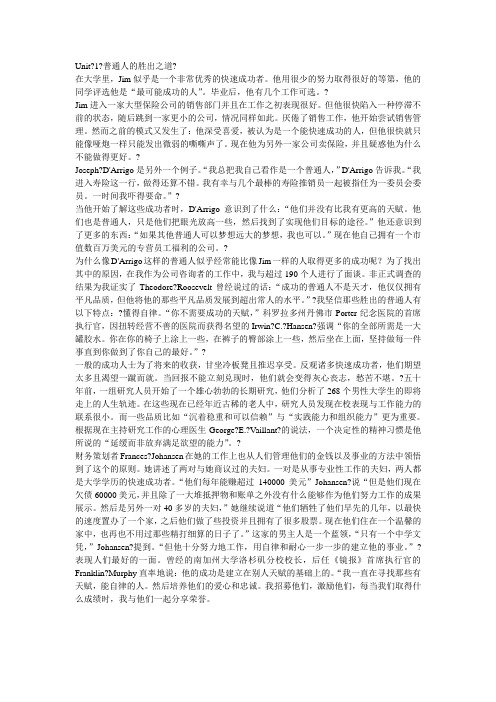
Unit?1?普通人的胜出之道?在大学里,Jim似乎是一个非常优秀的快速成功者。
他用很少的努力取得很好的等第,他的同学评选他是“最可能成功的人”。
毕业后,他有几个工作可选。
?Jim进入一家大型保险公司的销售部门并且在工作之初表现很好。
但他很快陷入一种停滞不前的状态,随后跳到一家更小的公司,情况同样如此。
厌倦了销售工作,他开始尝试销售管理。
然而之前的模式又发生了:他深受喜爱,被认为是一个能快速成功的人,但他很快就只能像哑炮一样只能发出微弱的嘶嘶声了。
现在他为另外一家公司卖保险,并且疑惑他为什么不能做得更好。
?Joseph?D'Arrigo是另外一个例子。
“我总把我自己看作是一个普通人,”D'Arrigo告诉我。
“我进入寿险这一行,做得还算不错。
我有幸与几个最棒的寿险推销员一起被指任为一委员会委员。
一时间我吓得要命。
”?当他开始了解这些成功者时,D'Arrigo意识到了什么:“他们并没有比我有更高的天赋。
他们也是普通人,只是他们把眼光放高一些,然后找到了实现他们目标的途径。
”他还意识到了更多的东西:“如果其他普通人可以梦想远大的梦想,我也可以。
”现在他自己拥有一个市值数百万美元的专营员工福利的公司。
?为什么像D'Arrigo这样的普通人似乎经常能比像Jim一样的人取得更多的成功呢?为了找出其中的原因,在我作为公司咨询者的工作中,我与超过190个人进行了面谈。
非正式调查的结果为我证实了Theodore?Roosevelt曾经说过的话:“成功的普通人不是天才,他仅仅拥有平凡品质,但他将他的那些平凡品质发展到超出常人的水平。
”?我坚信那些胜出的普通人有以下特点:?懂得自律。
“你不需要成功的天赋,”科罗拉多州丹佛市Porter纪念医院的首席执行官,因扭转经营不善的医院而获得名望的Irwin?C.?Hansen?强调“你的全部所需是一大罐胶水。
你在你的椅子上涂上一些,在裤子的臀部涂上一些,然后坐在上面,坚持做每一件事直到你做到了你自己的最好。
英语泛读教程4课文翻译
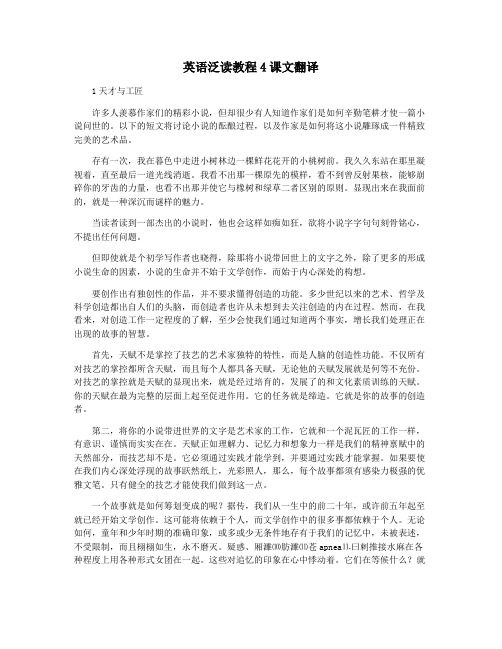
英语泛读教程4课文翻译1天才与工匠许多人羡慕作家们的精彩小说,但却很少有人知道作家们是如何辛勤笔耕才使一篇小说问世的。
以下的短文将讨论小说的酝酿过程,以及作家是如何将这小说雕琢成一件精致完美的艺术品。
存有一次,我在暮色中走进小树林边一棵鲜花花开的小桃树前。
我久久东站在那里凝视着,直至最后一道光线消逝。
我看不出那一棵原先的模样,看不到曾反射果核,能够崩碎你的牙齿的力量,也看不出那并使它与橡树和绿草二者区别的原则。
显现出来在我面前的,就是一种深沉而谜样的魅力。
当读者读到一部杰出的小说时,他也会这样如痴如狂,欲将小说字字句句刻骨铭心,不提出任何问题。
但即使就是个初学写作者也晓得,除那将小说带回世上的文字之外,除了更多的形成小说生命的因素,小说的生命并不始于文学创作,而始于内心深处的构想。
要创作出有独创性的作品,并不要求懂得创造的功能。
多少世纪以来的艺术、哲学及科学创造都出自人们的头脑,而创造者也许从未想到去关注创造的内在过程。
然而,在我看来,对创造工作一定程度的了解,至少会使我们通过知道两个事实,增长我们处理正在出现的故事的智慧。
首先,天赋不是掌控了技艺的艺术家独特的特性,而是人脑的创造性功能。
不仅所有对技艺的掌控都所含天赋,而且每个人都具备天赋,无论他的天赋发展就是何等不充份。
对技艺的掌控就是天赋的显现出来,就是经过培育的,发展了的和文化素质训练的天赋。
你的天赋在最为完整的层面上起至促进作用。
它的任务就是缔造。
它就是你的故事的创造者。
第二,将你的小说带进世界的文字是艺术家的工作,它就和一个泥瓦匠的工作一样,有意识、谨慎而实实在在。
天赋正如理解力、记忆力和想象力一样是我们的精神禀赋中的天然部分,而技艺却不是。
它必须通过实践才能学到,并要通过实践才能掌握。
如果要使在我们内心深处浮现的故事跃然纸上,光彩照人,那么,每个故事都须有感染力极强的优雅文笔。
只有健全的技艺才能使我们做到这一点。
一个故事就是如何筹划变成的呢?据传,我们从一生中的前二十年,或许前五年起至就已经开始文学创作。
大学英语泛读教程第四册全文翻译
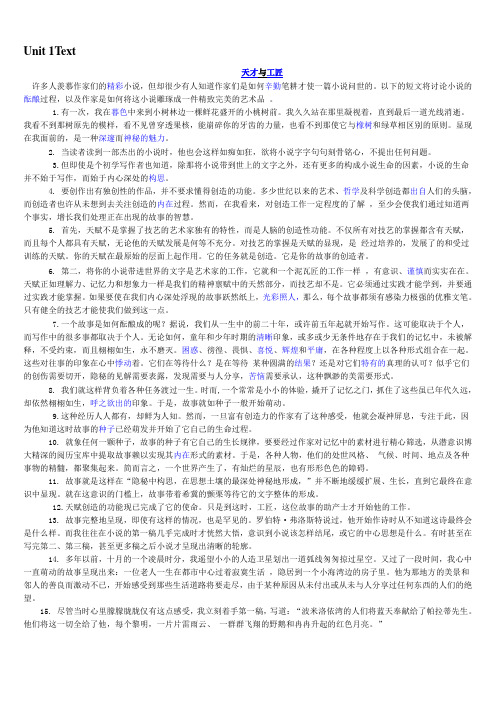
Unit 1Text天才与工匠许多人羡慕作家们的精彩小说,但却很少有人知道作家们是如何辛勤笔耕才使一篇小说问世的。
以下的短文将讨论小说的酝酿过程,以及作家是如何将这小说雕琢成一件精致完美的艺术品。
1.有一次,我在暮色中来到小树林边一棵鲜花盛开的小桃树前。
我久久站在那里凝视着,直到最后一道光线消逝。
我看不到那树原先的模样,看不见曾穿透果核,能崩碎你的牙齿的力量,也看不到那使它与橡树和绿草相区别的原则。
显现在我面前的,是一种深邃而神秘的魅力。
2. 当读者读到一部杰出的小说时,他也会这样如痴如狂,欲将小说字字句句刻骨铭心,不提出任何问题。
3.但即使是个初学写作者也知道,除那将小说带到世上的文字之外,还有更多的构成小说生命的因素,小说的生命并不始于写作,而始于内心深处的构思。
4. 要创作出有独创性的作品,并不要求懂得创造的功能。
多少世纪以来的艺术、哲学及科学创造都出自人们的头脑,而创造者也许从未想到去关注创造的内在过程。
然而,在我看来,对创造工作一定程度的了解,至少会使我们通过知道两个事实,增长我们处理正在出现的故事的智慧。
5. 首先,天赋不是掌握了技艺的艺术家独有的特性,而是人脑的创造性功能。
不仅所有对技艺的掌握都含有天赋,而且每个人都具有天赋,无论他的天赋发展是何等不充分。
对技艺的掌握是天赋的显现,是经过培养的,发展了的和受过训练的天赋。
你的天赋在最原始的层面上起作用。
它的任务就是创造。
它是你的故事的创造者。
6. 第二,将你的小说带进世界的文字是艺术家的工作,它就和一个泥瓦匠的工作一样,有意识、谨慎而实实在在。
天赋正如理解力、记忆力和想象力一样是我们的精神禀赋中的天然部分,而技艺却不是。
它必须通过实践才能学到,并要通过实践才能掌握。
如果要使在我们内心深处浮现的故事跃然纸上,光彩照人,那么,每个故事都须有感染力极强的优雅文笔。
只有健全的技艺才能使我们做到这一点。
7.一个故事是如何酝酿成的呢?据说,我们从一生中的前二十年,或许前五年起就开始写作。
英语泛读教程4unit2ThreeDaystoSee课文和译文之欧阳法创编

Three Days to Seeby Helen KellerHelen Keller, blind and deaf from infancy, became a successful lecturer, author and educator with the help of her teacher. In the following essay, she discussed how people should value their ability to see.All of us have read thrilling stories in which the hero had only a limited and specified time to live. Sometimes it was as long as a year; sometimes as short as twenty-four hours. But always we were interested in discovering just how the doomed man chose to spend his last days or his last hours.I speak, of course, of free men who have a choice, not condemned criminals whose sphere of activities is strictly delimited.Such stories set us thinking, wondering what we should do under similar circumstances. What events, what experiences, what associations should we crowd into thoselast hours as mortal beings? What happiness should we find in reviewing the past, what regrets?Sometimes I have thought it would be an excellent rule to live each day as if we should die tomorrow. Such an attitude would emphasize sharply the values of life. We should live each day with a gentleness, a vigor, and a keenness of appreciation which are often lost when time stretches before us in the constant panorama of more days and months and years to come. There are those, of course, who would adopt the Epicurean motto of “Eat, drink, and be merry;” but most people would be chastened by the certainty of impending death.In stories, the doomed hero is usually saved at the last minute by some stroke of fortune, but almost always his sense of values is changed. He becomes more appreciative of the meaning of life and its permanent spiritual values. It has often been noted that those who live, or have lived, in the shadow of death bring a mellow sweetness to everything they do.Most of us, however, take life for granted. We know that one day we must die, but usually we picture that day as far in the future. When we are in buoyant health, death is all but unimaginable. We seldom think of it. The days stretch out in an endless vista. So we go about our petty tasks, hardly aware of our listless attitude toward life.The same lethargy, I am afraid, characterizes the use of all our faculties and senses. Only the deaf appreciate hearing, only the blind realize the manifold blessings that lie in sight. Particularly does this observation apply to those who have lost sight and hearing in adult life. But those who have never suffered impairment of sight or hearing seldom make the fullest use of these blessed faculties. Their eyes and ears take in all sights and sounds hazily, without concentration, and with little appreciation. It is the same old story of not being grateful for what we have until we lose it, of not being conscious of health until we are ill.I have often thought it would be a blessing if each human being were stricken blind and deaf for a few days at some time during his early adult life. Darkness would make himmore appreciative of sight; silence would teach him the joys of sound.Now and then I have tested my seeing friends to discover what they see. Recently I was visited by a very good friend who had just returned from a long walk in the woods, and I asked her what she had observed. “Nothing in particular,” she replied. I might have been incredulous had I not been accustomed to such responses, for long ago I became convinced that the seeing see little.How was it possible, I asked myself, to walk for an hour through the woods and see nothing worthy of note? I who cannot see find hundreds of things to interest me through mere touch. I feel the delicate symmetry of a leaf. I pass my hands lovingly about the smooth skin of a silver birch, or the rough shaggy bark of a pine. In spring I touch the branches of trees hopefully in search of a bud, the first sign of awakening Nature after her winter's sleep. I feel the delightful, velvety texture of a flower, and discover its remarkable convolutions; and something of the miracle of Nature is revealed to me. Occasionally, if I am veryfortunate, I place my hand gently on a small tree and feel the happy quiver of a bird in full song. I am delighted to have the cool water of a brook rush through my open fingers. To me a lush carpet of pine needles or spongy grass is more welcome than the most luxurious Persian rug. To me the pageant of seasons is a thrilling and unending drama, the action of which streams through my finger tips. At times my heart cries out with longing to see all these things. If I can get so much pleasure from mere touch, how much more beauty must be revealed by sight. Yet, those who have eyes apparently see little. The panorama of colour and action which fills the world is taken for granted. It is human, perhaps, to appreciate little that which we have and to long for that which we have not, but it is a great pity that in the world of light the gift of sight is used only as a mere convenience rather than as a means of adding fullness to life.If I were the president of a university I should establish a compulsory co urse in “How to Use Your Eyes”. The professor would try to show his pupils how they could addjoy to their lives by really seeing what passes unnoticed before them. He would try to awake their dormant and sluggish faculties.Suppose you set your mind to work on the problem of how you would use your own eyes if you had only three more days to see. If with the oncoming darkness of the third night you knew that the sun would never rise for you again, how would you spend those three precious intervening days? What would you most want to let your gaze rest upon?I, naturally, should want most to see the things which have become dear to me through my years of darkness. You, too, would want to let your eyes rest long on the things that have become dear to you so that you could take the memory of them with you into the night that loomed before you.I should want to see the people whose kindness and gentleness and companionship have made my life worth living. First I should like to gaze long upon the face of mydear teacher, Mrs. Anne Sullivan Macy, who came to me when I was a child and opened the outer world to me. I should want not merely to see the outline of her face, so that I could cherish it in my memory, but to study that face and find in it the living evidence of the sympathetic tenderness and patience with which she accomplished the difficult tasks of my education. I should like to see in her eyes that strength of character which has enabled her to stand firm in the face of difficulties, and that compassion for all humanity which she has revealed to me so often.I do not know what it is to see into the heart of a friend through that “window of the soul”, the eye. I can only “see” through my finger tips the outline of a face. I can detect laughter, sorrow, and many other obvious emotions.I know my friends from the feel of their faces. But I cannot really picture their personalities by touch. I know their personalities, of course, through other means, through the thoughts they express to me, through whatever of their actions are revealed to me. But I am denied that deeper understanding of them which I am sure wouldcome through sight of them through watching their reactions to various expressed thoughts and circumstances, through noting the immediate and fleeting reactions of their eyes and countenance.Friends who are near to me I know well, because through the months and years they reveal themselves to me in all their phases; but of causal friends I have only an incomplete impression, an impression gained from a handclasp, from spoken words which I take from their lips with my finger tips, or which they tap into the palm of my hand.How much easier, how much more satisfying it is for you who can see to grasp quickly the essential qualities of another person by watching the subtleties of expression, the quiver of a muscle, the flutter of a hand. But does it ever occur to you to use your sight to see into the inner nature of a friend or acquaintance? Do not most of you seeing people grasp casually the outward features of a face and let it go at that?For instance, can you describe accurately the faces of five good friends? Some of you can, but many cannot. As an experiment, I have questioned husbands of long standing about the color of their wives' eyes, and often they express embarrassed confusion and admit that they do not know. And, incidentally, it is a chronic complaint of wives that their husbands do not notice new dresses, new hats, and changes in household arrangements.The eyes of seeing persons soon become accustomed to the routine of their surroundings, and they actually see only the startling and spectacular. But even in viewing the most spectacular sights the eyes are lazy. Court records reveal every day how inaccurately “eyewitnesses” see. A given event will be “seen” in several different ways by as many witnesses. Some see more than others, but few see everything that is within the range of their vision.Oh, the things that I should see if I had the power of sight for just three days!(1634 words)译文假如我有三天光明海伦·凯勒海伦·凯勒自幼就又盲又聋,在老师的帮助下成为一名成功的讲师、作家及教育家。
新编大学英语四泛读课文翻译
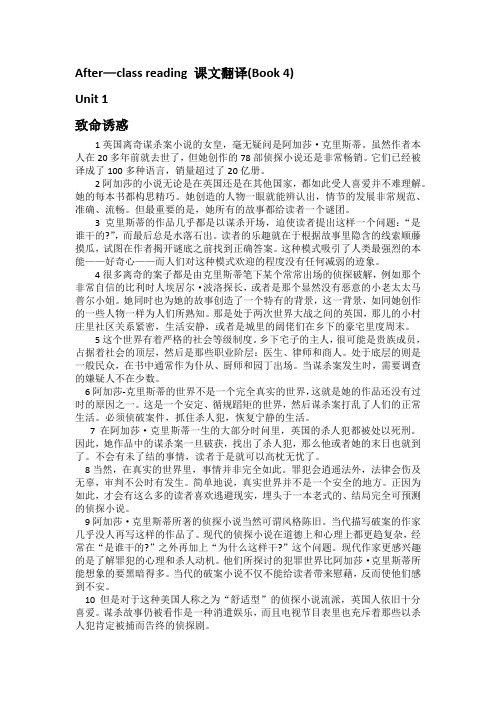
After—class reading 课文翻译(Book 4)Unit 1致命诱惑1英国离奇谋杀案小说的女皇,毫无疑问是阿加莎·克里斯蒂。
虽然作者本人在20多年前就去世了,但她创作的78部侦探小说还是非常畅销。
它们已经被译成了100多种语言,销量超过了20亿册。
2阿加莎的小说无论是在英国还是在其他国家,都如此受人喜爱并不难理解。
她的每本书都构思精巧。
她创造的人物一眼就能辨认出,情节的发展非常规范、准确、流畅。
但最重要的是,她所有的故事都给读者一个谜团。
3克里斯蒂的作品几乎都是以谋杀开场,迫使读者提出这样一个问题:“是谁干的?”,而最后总是水落石出。
读者的乐趣就在于根据故事里隐含的线索顺藤摸瓜,试图在作者揭开谜底之前找到正确答案。
这种模式吸引了人类最强烈的本能——好奇心——而人们对这种模式欢迎的程度没有任何减弱的迹象。
4很多离奇的案子都是由克里斯蒂笔下某个常常出场的侦探破解,例如那个非常自信的比利时人埃居尔·波洛探长,或者是那个显然没有恶意的小老太太马普尔小姐。
她同时也为她的故事创造了一个特有的背景,这一背景,如同她创作的一些人物一样为人们所熟知。
那是处于两次世界大战之间的英国,那儿的小村庄里社区关系紧密,生活安静,或者是城里的阔佬们在乡下的豪宅里度周末。
5这个世界有着严格的社会等级制度。
乡下宅子的主人,很可能是贵族成员,占据着社会的顶层,然后是那些职业阶层:医生、律师和商人。
处于底层的则是一般民众,在书中通常作为仆从、厨师和园丁出场。
当谋杀案发生时,需要调查的嫌疑人不在少数。
6阿加莎-克里斯蒂的世界不是一个完全真实的世界,这就是她的作品还没有过时的原因之一。
这是一个安定、循规蹈矩的世界,然后谋杀案打乱了人们的正常生活。
必须侦破案件,抓住杀人犯,恢复宁静的生活。
7在阿加莎·克里斯蒂一生的大部分时问里,英国的杀人犯都被处以死刑。
因此,她作品中的谋杀案一旦破获,找出了杀人犯,那么他或者她的末日也就到了。
英语泛读教程4unit 2 Three Days to See课文和译文
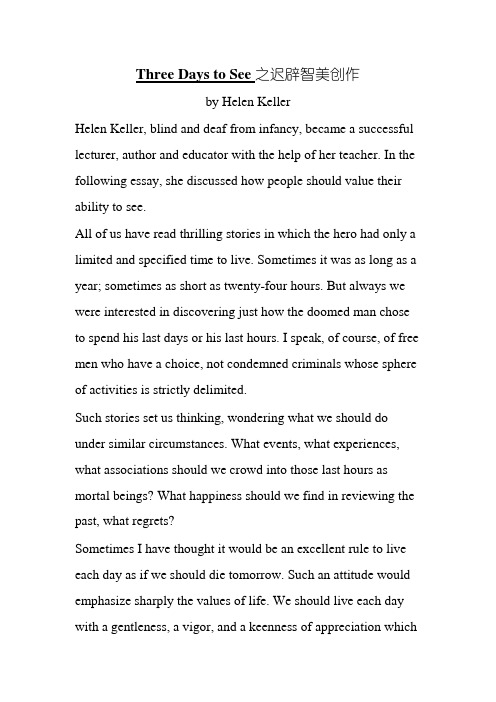
Three Days to See 之迟辟智美创作by Helen KellerHelen Keller, blind and deaf from infancy, became a successful lecturer, author and educator with the help of her teacher. In the following essay, she discussed how people should value their ability to see.All of us have read thrilling stories in which the hero had only a limited and specified time to live. Sometimes it was as long as a year; sometimes as short as twenty-four hours. But always we were interested in discovering just how the doomed man chose to spend his last days or his last hours. I speak, of course, of free men who have a choice, not condemned criminals whose sphere of activities is strictly delimited.Such stories set us thinking, wondering what we should do under similar circumstances. What events, what experiences, what associations should we crowd into those last hours as mortal beings? What happiness should we find in reviewing the past, what regrets?Sometimes I have thought it would be an excellent rule to live each day as if we should die tomorrow. Such an attitude would emphasize sharply the values of life. We should live each day with a gentleness, a vigor, and a keenness of appreciation whichare often lost when time stretches before us in the constant panorama of more days and months and years to come. There are those, of course, who would adopt the Epicurean motto of “Eat, drink, and be merry;” but most people would be chastened by the certainty of impending death.In stories, the doomed hero is usually saved at the last minute by some stroke of fortune, but almost always his sense of values is changed. He becomes more appreciative of the meaning of life and its permanent spiritual values. It has often been noted that those who live, or have lived, in the shadow of death bring a mellow sweetness to everything they do.Most of us, however, take life for granted. We know that one day we must die, but usually we picture that day as far in the future. When we are in buoyant health, death is all but unimaginable. We seldom think of it. The days stretch out in an endless vista. So we go about our petty tasks, hardly aware of our listless attitude toward life.The same lethargy, I am afraid, characterizes the use of all our faculties and senses. Only the deaf appreciate hearing, only the blind realize the manifold blessings that lie in sight. Particularly does this observation apply to those who have lost sight and hearing in adult life. But those who have never sufferedimpairment of sight or hearing seldom make the fullest use of these blessed faculties. Their eyes and ears take in all sights and sounds hazily, without concentration, and with little appreciation. It is the same old story of not being grateful for what we have until we lose it, of not being conscious of health until we are ill.I have often thought it would be a blessing if each human being were stricken blind and deaf for a few days at some time during his early adult life. Darkness would make him more appreciative of sight; silence would teach him the joys of sound.Now and then I have tested my seeing friends to discover what they see. Recently I was visited by a very good friend who had just returned from a long walk in the woods, and I asked her what she had observed. “Nothing in particular,” she replied. I might have been incredulous had I not been accustomed to such responses, for long ago I became convinced that the seeing see little.How was it possible, I asked myself, to walk for an hour through the woods and see nothing worthy of note? I who cannot see find hundreds of things to interest me through mere touch. I feel the delicate symmetry of a leaf. I pass my hands lovingly about the smooth skin of a silver birch, or the rough shaggy bark of apine. In spring I touch the branches of trees hopefully in search of a bud, the first sign of awakening Nature after her winter's sleep. I feel the delightful, velvety texture of a flower, and discover its remarkable convolutions; and something of the miracle of Nature is revealed to me. Occasionally, if I am very fortunate, I place my hand gently on a small tree and feel the happy quiver of a bird in full song. I am delighted to have the cool water of a brook rush through my open fingers. To me a lush carpet of pine needles or spongy grass is more welcome than the most luxurious Persian rug. To me the pageant of seasons is a thrilling and unending drama, the action of which streams through my finger tips.At times my heart cries out with longing to see all these things. If I can get so much pleasure from mere touch, how much more beauty must be revealed by sight. Yet, those who have eyes apparently see little. The panorama of colour and action which fills the world is taken for granted. It is human, perhaps, to appreciate little that which we have and to long for that which we have not, but it is a great pity that in the world of light the gift of sight is used only as a mere convenience rather than as a means of adding fullness to life.If I were the president of a university I should establish a compulsory course in “How to Use Your Eyes”. The professor would try to show his pupils how they could add joy to their lives by really seeing what passes unnoticed before them. He would try to awake their dormant and sluggish faculties. Suppose you set your mind to work on the problem of how you would use your own eyes if you had only three more days to see. If with the oncoming darkness of the third night you knew that the sun would never rise for you again, how would you spend those three precious intervening days? What would you most want to let your gaze rest upon?I, naturally, should want most to see the things which have become dear to me through my years of darkness. You, too, would want to let your eyes rest long on the things that have become dear to you so that you could take the memory of them with you into the night that loomed before you.I should want to see the people whose kindness and gentleness and companionship have made my life worth living. First I should like to gaze long upon the face of my dear teacher, Mrs. Anne Sullivan Macy, who came to me when I was a child and opened the outer world to me. I should want not merely to seethe outline of her face, so that I could cherish it in my memory, but to study that face and find in it the living evidence of the sympathetic tenderness and patience with which she accomplished the difficult tasks of my education. I should like to see in her eyes that strength of character which has enabled her to stand firm in the face of difficulties, and that compassion for all humanity which she has revealed to me so often.I do not know what it is to see into the heart of a friend through that “window of the soul”, the eye. I can only “see” through my finger tips the outline of a face. I can detect laughter, sorrow, and many other obvious emotions. I know my friends from the feel of their faces. But I cannot really picture their personalities by touch. I know their personalities, of course, through other means, through the thoughts they express to me, through whatever of their actions are revealed to me. But I am denied that deeper understanding of them which I am sure would come through sight of them through watching their reactions to various expressed thoughts and circumstances, through noting the immediate and fleeting reactions of their eyes and countenance.Friends who are near to me I know well, because through the months and years they reveal themselves to me in all theirphases; but of causal friends I have only an incomplete impression, an impression gained from a handclasp, from spoken words which I take from their lips with my finger tips, or which they tap into the palm of my hand.How much easier, how much more satisfying it is for you who can see to grasp quickly the essential qualities of another person by watching the subtleties of expression, the quiver of a muscle, the flutter of a hand. But does it ever occur to you to use your sight to see into the inner nature of a friend or acquaintance? Do not most of you seeing people grasp casually the outward features of a face and let it go at that?For instance, can you describe accurately the faces of five good friends? Some of you can, but many cannot. As an experiment, I have questioned husbands of long standing about the color of their wives' eyes, and often they express embarrassed confusion and admit that they do not know. And, incidentally, it is a chronic complaint of wives that their husbands do not notice new dresses, new hats, and changes in household arrangements. The eyes of seeing persons soon become accustomed to the routine of their surroundings, and they actually see only the startling and spectacular. But even in viewing the most spectacular sights the eyes are lazy. Court records reveal everyday how inaccurately “eyewitnesses” see. A given event will be “seen” in several different ways by as many witnesses. Some see more than others, but few see everything that is within the range of their vision.Oh, the things that I should see if I had the power of sight for just three days!(1634 words)译文假如我有三天光明海伦·凯勒海伦·凯勒自幼就又盲又聋,在老师的帮手下成为一名胜利的讲师、作家及教育家.在这篇文章里,海伦·凯勒讨论了人们应该怎样珍惜自己的视觉能力我们年夜家都读过这样一些惊心动魄的故事,故事中的主人公能活的时间有限而具体,或长达一年,或短至24小时.可是我们总是感兴趣的是,行将死亡的人究竟愿意怎样渡过他的最后时光.固然,我说的是能进行选择的自由人,而不是活动范围受到严格限制的囚犯.这些故事启迪我们思考,诱发我们想象,当我们处于此类情况时,该怎么做呢?作为凡人,我们在最后的时刻会急于想干些什么,体验些什么,联想些什么呢?回首往事时,我们又能领略到何种快慰,何种悔恨呢?有时我想,如果我们渡过每一天时都假定明天即将去世,这会是个极好的准则.这样的处世态度会强烈地突出身命的价值.我们会亲切地、暮气蓬勃地、感受强烈地来渡过每一天,而这一切却往往在日复一日延续的时光与岁月之中消失.固然,有些人会奉行享乐主义“吃喝玩乐”的信条,可是年夜大都人则会因死亡就在眼前而心灵获得净化.在故事中,那死神呼唤的主人公通常在最后时刻交上好运而获得拯救,但他的价值观几乎总是发生了变动.他更加珍视生命的意义及其永恒而神圣的价值.人们经常注意到,那些生活在或者曾生活在死亡的阴影下的人,对他们所做的每一件事都赋予甜美的色彩.然而,我们中间年夜大都人则把生命视为理所固然.我们知道,总有一天我们会死去,但通常我们又把那一天想象为遥远的未来.当我们身体健康时,死亡是件难以想象的事,我们几乎不会想到它.岁月无穷,因此我们忙于种种琐事,几乎意识不到我们漠然的生活态度.我们在使用感觉功能时,恐怕也持同样的冷漠态度.只有聋者才知道听觉的重要,只有盲人才理解视觉给人带来的各种恩赐.这一观点特别适用于那些在成年后才丧失视觉和听觉的人.而那些视觉和听觉从未受到损害的人,则很少充沛利用这些神圣的官能.他们的眼睛和耳朵模糊地、漫不经心地、不加欣赏地纳入所有的景象和声音.还是那句老话:工具丧失后方知珍贵,直到生病时才思健康.我经常想,如果每个人在刚成年时某个时候能失明或失聪几天,这或许将是件喜事.黑暗将使他更加珍视景象;而寂静则将教他领略声音的欢乐.我不时考一考我的有视力的朋友,以了解他们看到了什么.最近一位好朋友来看我,她是在林中溜达了好一会儿才回来的,我问她观察到了些什么.“没什么特另外工具,”她答道.要不是我对类似的反应已习以为常的话,我是会觉得难以置信的.其实,我早已深信:有视力者所见甚少.我问自己,在林中溜达了一个小时而竟未看到什么值得注意的工具,这怎么可能呢?我这个看不见工具的人,仅凭触摸就发现千百种使我感兴趣的工具.我感觉到树叶精致的对称.我用手爱抚着光滑的白烨树皮,或是粗拙的松树皮.春季里,我满怀希望地触摸树枝,寻找一个幼芽——年夜自然经过冬季觉醒重又苏醒的最初征兆.我摸着花朵上那可爱的天鹅绒般的质地,以及它那叠合巧妙的花苞,于是我领略到了某种年夜自然的神奇.偶尔,如果十分幸运的话,我把手轻轻搭在一棵小树上,能感到一只小鸟儿尽情欢歌的颤抖.我非常高兴让清凉的溪水流过我张开的手指.对我来说,那厚密的松针层或茂盛松软的草地比豪华的波斯地毯更惬意;对我来说,四季的幻化多姿宛如一出动听心弦永不尽止的戏剧,它的情节似流水从我指尖缓缓流过.我的心时时在呼号,渴望能见到所有这一切.如果我单靠触摸就能获得如此多的乐趣,那么通过视觉则能领略到更多美景!可是,那些视觉完好的人显然所见甚少.年夜千世界的五光十色与千姿百态被认为是理所固然.对已获得的不以为然,而对未获得的却期盼不已,这一点或许是人类的特性,可是,非常遗憾,在光明的世界里,天赐的视觉只被看成一种纯真的方便,而不是一种使生活日益完美的手段. 如果我是年夜学校长,我就要开设一门必修课,“如何使用你们的眼睛”.教授应尽力向学生演示,如何做到真正看见那些从他们面前不知不觉溜失落的工具,从而为自己的生活增添快乐.他将尽力唤醒他们那些昏睡懒散的感官.假定你在开动脑筋研究这一问题:如果你只有三天的视力,你将如何使用你的眼睛呢?如果你知道,当第三天的黑夜来临,太阳就永远不再为你升起,你将如何渡过这贵重的三天呢?你最想让你的目光落在何处?我固然最愿意看的,是那些在我整个失明岁月里对我已变得亲切的工具.你也会想让你的目光长久地停留在那些对你已变得亲切的工具上,这样你就可以把对它们的记忆带进那悄然而来的漫漫长夜中去.我要看看那些待我仁慈、温和、友好,从而使我的生活变得有价值的人.首先,我要好好地打量我的恩师安·沙利文·梅丝夫人的脸.她在我年幼的时候就来到我身边,替我翻开了外部世界.我不单想看她的脸形,以便能把它珍藏在我的记忆中,而且还想细细琢磨这脸容,为她那柔情与耐心找到活生生的证据,她正是怀着这种柔情与耐心完成了教育我的艰巨任务.我想在她的眼中看到那种使她坚定空中对各种困难的个性的力量,以及那种经常在我面前流露出来的对全人类的同情心.我不知道,透过"心灵之窗",即眼睛,来探视一个朋友的心是怎么回事.我只能通过我的指尖来"看"一张脸的轮廓.我能探察到欢笑、忧伤和许多其他明显的感情.我根据触摸脸庞的感觉来识别朋友,可是我简直不能靠触摸来描绘出他们的个性.固然,我通过其他手段,通过他们向我表达的思想,通过他们向我暗示出的行动来了解他们的个性.可是,我无法对他们有更深的理解,因为我确信,要到达这种更深的理解,必需要目视他们,观察他们对各种所表达的思想及情况所作的反应,留意他们眼睛里和脸上那种转瞬即逝的反应.我熟悉和我亲近的朋友,因为长年累月他们向我显露了自己的各个方面;然而对偶尔结识的朋友我只有一种不完全的印象,这种印象是仅凭一次握手,一些言语获得的.我用指尖触摸他们的嘴唇,或是靠他们叩击我的手掌而获取这些言语.相比之下,你们这些能看见的人,通过观察脸色的微妙变动、肌肉的颤抖和手的摆动来迅速地掌控他人的实质特点,就容易很多,也令人满意很多.可是,你们可曾想到要用自己的视觉去看透一个朋友或熟人的内在性格?你们这些有视觉的人中的年夜大都,不就是随便看到一张脸的外部特征就到此为止了吗?举例来说,你能准确地描绘出五个好朋友的脸形吗?你们中有些人可以,但许多人不成.作为试验,我曾向一些结婚多年的丈夫询问过他们妻子眼睛的颜色,但他们经常暗示出尴尬困惑,供认不知道.顺便提一下,妻子们老是埋怨丈夫不注意她们的新衣服、新帽子以及房间安插中的变动.有视觉的人,眼睛很快就习惯了周围的日常事物,因此他实际上只见到一些惊人的、壮观的景象.可是,哪怕是在看最壮观的局面时,他们的眼睛也是懒洋洋的.法院记录天天都标明“目击者”所见是何等地禁绝确.某一事件可能被几个目击者从几个分歧角度“看到”;有些人比他人看很多些,但几乎没有人看到他们视野之内的一切.哦,如果我能有即使仅仅三天的光明,我将能见到几多我想看到的工具啊!。
英语泛读教程4第三版翻译
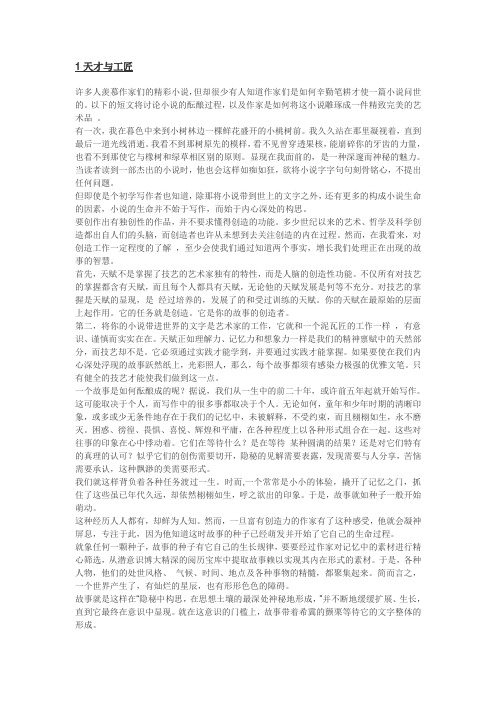
1天才与工匠许多人羡慕作家们的精彩小说,但却很少有人知道作家们是如何辛勤笔耕才使一篇小说问世的。
以下的短文将讨论小说的酝酿过程,以及作家是如何将这小说雕琢成一件精致完美的艺术品。
有一次,我在暮色中来到小树林边一棵鲜花盛开的小桃树前。
我久久站在那里凝视着,直到最后一道光线消逝。
我看不到那树原先的模样,看不见曾穿透果核,能崩碎你的牙齿的力量,也看不到那使它与橡树和绿草相区别的原则。
显现在我面前的,是一种深邃而神秘的魅力。
当读者读到一部杰出的小说时,他也会这样如痴如狂,欲将小说字字句句刻骨铭心,不提出任何问题。
但即使是个初学写作者也知道,除那将小说带到世上的文字之外,还有更多的构成小说生命的因素,小说的生命并不始于写作,而始于内心深处的构思。
要创作出有独创性的作品,并不要求懂得创造的功能。
多少世纪以来的艺术、哲学及科学创造都出自人们的头脑,而创造者也许从未想到去关注创造的内在过程。
然而,在我看来,对创造工作一定程度的了解,至少会使我们通过知道两个事实,增长我们处理正在出现的故事的智慧。
首先,天赋不是掌握了技艺的艺术家独有的特性,而是人脑的创造性功能。
不仅所有对技艺的掌握都含有天赋,而且每个人都具有天赋,无论他的天赋发展是何等不充分。
对技艺的掌握是天赋的显现,是经过培养的,发展了的和受过训练的天赋。
你的天赋在最原始的层面上起作用。
它的任务就是创造。
它是你的故事的创造者。
第二,将你的小说带进世界的文字是艺术家的工作,它就和一个泥瓦匠的工作一样,有意识、谨慎而实实在在。
天赋正如理解力、记忆力和想象力一样是我们的精神禀赋中的天然部分,而技艺却不是。
它必须通过实践才能学到,并要通过实践才能掌握。
如果要使在我们内心深处浮现的故事跃然纸上,光彩照人,那么,每个故事都须有感染力极强的优雅文笔。
只有健全的技艺才能使我们做到这一点。
一个故事是如何酝酿成的呢?据说,我们从一生中的前二十年,或许前五年起就开始写作。
这可能取决于个人,而写作中的很多事都取决于个人。
大学英语泛读教程第四册全文翻译
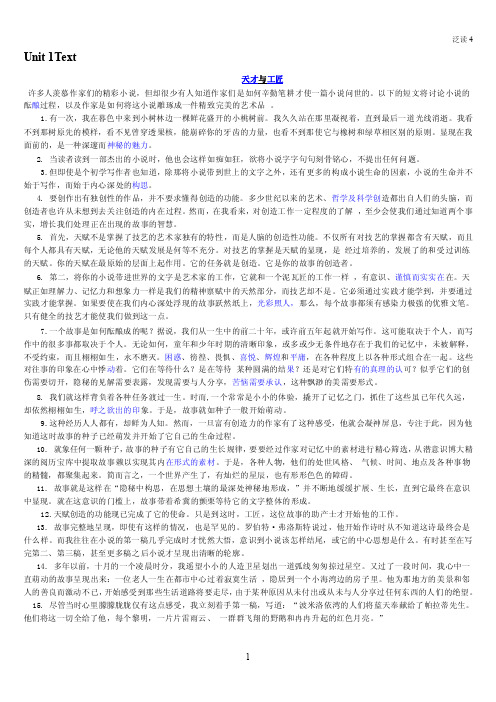
Unit 1Text天才与工匠许多人羡慕作家们的精彩小说,但却很少有人知道作家们是如何辛勤笔耕才使一篇小说问世的。
以下的短文将讨论小说的酝酿过程,以及作家是如何将这小说雕琢成一件精致完美的艺术品。
1.有一次,我在暮色中来到小树林边一棵鲜花盛开的小桃树前。
我久久站在那里凝视着,直到最后一道光线消逝。
我看不到那树原先的模样,看不见曾穿透果核,能崩碎你的牙齿的力量,也看不到那使它与橡树和绿草相区别的原则。
显现在我面前的,是一种深邃而神秘的魅力。
2. 当读者读到一部杰出的小说时,他也会这样如痴如狂,欲将小说字字句句刻骨铭心,不提出任何问题。
3.但即使是个初学写作者也知道,除那将小说带到世上的文字之外,还有更多的构成小说生命的因素,小说的生命并不始于写作,而始于内心深处的构思。
4. 要创作出有独创性的作品,并不要求懂得创造的功能。
多少世纪以来的艺术、哲学及科学创造都出自人们的头脑,而创造者也许从未想到去关注创造的内在过程。
然而,在我看来,对创造工作一定程度的了解,至少会使我们通过知道两个事实,增长我们处理正在出现的故事的智慧。
5. 首先,天赋不是掌握了技艺的艺术家独有的特性,而是人脑的创造性功能。
不仅所有对技艺的掌握都含有天赋,而且每个人都具有天赋,无论他的天赋发展是何等不充分。
对技艺的掌握是天赋的显现,是经过培养的,发展了的和受过训练的天赋。
你的天赋在最原始的层面上起作用。
它的任务就是创造。
它是你的故事的创造者。
6. 第二,将你的小说带进世界的文字是艺术家的工作,它就和一个泥瓦匠的工作一样,有意识、谨慎而实实在在。
天赋正如理解力、记忆力和想象力一样是我们的精神禀赋中的天然部分,而技艺却不是。
它必须通过实践才能学到,并要通过实践才能掌握。
如果要使在我们内心深处浮现的故事跃然纸上,光彩照人,那么,每个故事都须有感染力极强的优雅文笔。
英语泛读教程4__课文翻译

第一单元第一篇"Good words cost nothing, but are worth much,"said Thomas Fuller,the 17th century British scholar.“良言不费分文,但价值甚大,”托马斯说丰满,17th世纪英国学者。
They serve to give encouragement and smooth away differences and misunderstandings, as this article explains.他们服役给予鼓励和克服差异和误解,因为这篇文章解释了。
"Maybe when I'm a hundred,I'll get used to having everything I do taken for granted,"a young homemaker confided to her neighbor.“也许当我一百岁时,我就会习惯吃我做的一切视为理所当然,”一个年轻的家庭主妇被任命她的邻居。
"If Bill would compliment me once in a while, he'd make my life much happier."“如果法案恭维我,偶尔也好,他会使我的生活更幸福。
”Few of us realize how much we need encouragement.我们很少有人意识到我们是多么需要鼓励的。
Yet we must bask in the warmth of approval now and then or lose our self-confidence.但是我们仍然必须沐浴在温暖的批准,否则现在失去自己的自信。
All of us need to feel needed and admired.我们都需要去感觉需要和赞赏。
英语泛读教程4unit 2 Three Days to See课文和译文

Three Days to See 之袁州冬雪创作by Helen KellerHelen Keller, blind and deaf from infancy, became a successful lecturer, author and educator with the help of her teacher. In the following essay, she discussed how people should value their ability to see.All of us have read thrilling stories in which the hero had only a limited and specified time to live. Sometimes it was as long as a year; sometimes as short as twenty-four hours. But always we were interested in discovering just how the doomed man chose to spend his last days or his last hours. I speak, of course, of free men who have a choice, not condemned criminals whose sphere of activities is strictly delimited.Such stories set us thinking, wondering what we should do under similar circumstances. What events, what experiences, what associations should we crowd into those last hours as mortal beings? What happiness should we find in reviewing the past, what regrets?Sometimes I have thought it would be an excellent rule to live each day as if we should die tomorrow. Such an attitude would emphasize sharply the values of life. We should live each day with a gentleness, a vigor, and a keenness of appreciation which are often lost when time stretches before us in the constant panorama of more days and months and years to come. There are those, of course, who would adopt the Epicurean motto of “Eat, drink, and be merry;” but most people would be chastened by the certainty of impending death.In stories, the doomed hero is usually saved at the last minute by some stroke of fortune, but almost always his sense of values is changed. He becomes more appreciative of the meaning of life and its permanent spiritual values. It has often been noted that those who live, or have lived, in the shadow of death bring a mellow sweetness to everything they do.Most of us, however, take life for granted. We know that one day we must die, but usually we picture that day as far in the future. When we are inbuoyant health, death is all but unimaginable. We seldom think of it. The days stretch out in an endless vista. So we go about our petty tasks, hardly aware of our listless attitude toward life. The same lethargy, I am afraid, characterizes the use of all our faculties and senses. Only the deaf appreciate hearing, only the blind realize the manifold blessings that lie in sight. Particularly does this observation apply to those who have lost sight and hearing in adult life. But those who have never suffered impairment of sight or hearing seldom make the fullest use of these blessed faculties. Their eyes and ears take in all sights and sounds hazily, without concentration, and with little appreciation. It is the same old story of not being grateful for what we have until we lose it, of not being conscious of health until we are ill.I have often thought it would be a blessing if each human being were stricken blind and deaf for a few days at some time during his early adult life.Darkness would make him more appreciative of sight; silence would teach him the joys of sound.Now and then I have tested my seeing friends to discover what they see. Recently I was visited by a very good friend who had just returned from a long walk in the woods, and I asked her what she had observed. “Nothing in particular,” she replied. I might have been incredulous had I not been accustomed to such responses, for long ago I became convinced that the seeing see little.How was it possible, I asked myself, to walk for an hour through the woods and see nothing worthy of note? I who cannot see find hundreds of things to interest me through mere touch. I feel the delicate symmetry of a leaf. I pass my hands lovingly about the smooth skin of a silver birch, or the rough shaggy bark of a pine. In spring I touch the branches of trees hopefully in search of a bud, the first sign of awakening Nature after her winter's sleep. I feel the delightful, velvety texture of a flower, and discover its remarkable convolutions; and something of the miracle of Nature is revealedto me. Occasionally, if I am very fortunate, I place my hand gently on a small tree and feel the happy quiver of a bird in full song. I am delighted to have the cool water of a brook rush through my open fingers. To me a lush carpet of pine needles or spongy grass is more welcome than the most luxurious Persian rug. To me the pageant of seasons is a thrilling and unending drama, the action of which streams through my finger tips.At times my heart cries out with longing to see all these things. If I can get so much pleasure from mere touch, how much more beauty must be revealed by sight. Yet, those who have eyes apparently see little. The panorama of colour and action whichfills the world is taken for granted. It is human, perhaps, to appreciate little that which we have and to long for that which we have not, but it is a great pity that in the world of light the gift of sight is used only as a mere convenience rather than as a means of adding fullness to life.If I were the president of a university I should establish a compulsory course in “How to U se YourEyes”. The professor would try to show his pupils how they could add joy to their lives by really seeing what passes unnoticed before them. He would try to awake their dormant and sluggish faculties. Suppose you set your mind to work on the problem of how you would use your own eyes if you had only three more days to see. If with the oncoming darkness of the third night you knew that the sun would never rise for you again, how would you spend those three precious intervening days? What would you most want to let your gaze rest upon?I, naturally, should want most to see the things which have become dear to me through my years of darkness. You, too, would want to let your eyesrest long on the things that have become dear to you so that you could take the memory of them with you into the night that loomed before you.I should want to see the people whose kindness and gentleness and companionship have made my life worth living. First I should like to gaze long upon the face of my dear teacher, Mrs. Anne SullivanMacy, who came to me when I was a child and opened the outer world to me. I should want not merely to see the outline of her face, so that I couldcherish it in my memory, but to study that face and find in it the living evidence of the sympathetic tenderness and patience with which she accomplished the difficult tasks of my education. I should liketo see in her eyes that strength of character which has enabled her to stand firm in the face of difficulties, and that compassion for all humanity which she has revealed to me so often.I do not know what it is to see into the heart of a friend through that “window of the soul”, the eye.I can only “see” through my finger tips theoutline of a face. I can detect laughter, sorrow, and many other obvious emotions. I know my friends from the feel of their faces. But I cannot really picture their personalities by touch. I know their personalities, of course, through other means, through the thoughts they express to me, through whatever of their actions are revealed to me. But I am denied that deeper understanding of them which Iam sure would come through sight of them through watching their reactions to various expressed thoughts and circumstances, through noting the immediate and fleeting reactions of their eyes and countenance.Friends who are near to me I know well, because through the months and years they reveal themselves to me in all their phases; but of causal friends I have only an incomplete impression, an impression gained from a handclasp, from spoken words which I take from their lips with my finger tips, or which they tap into the palm of my hand.How much easier, how much more satisfying it is for you who can see to grasp quickly the essential qualities of another person by watching the subtleties of expression, the quiver of a muscle, the flutter of a hand. But does it ever occur to you to use your sight to see into the inner nature of a friend or acquaintance? Do not most of you seeing people grasp casually the outward features of a face and let it go at that?For instance, can you describe accurately the faces of five good friends? Some of you can, but many cannot. As an experiment, I have questioned husbands of long standing about the color of their wives' eyes, and often they express embarrassed confusion and admit that they do not know. And, incidentally, it is a chronic complaint of wives that their husbands do not notice new dresses, new hats, and changes in household arrangements.The eyes of seeing persons soon become accustomed to the routine of their surroundings, and they actually see only the startling and spectacular. But even in viewing the most spectacular sights the eyes are lazy. Court records reveal every day how inaccurately “eyewitnesses” see. A given event will be “seen” in several different ways by as many witnesses. Some see more than others, but few see everything that is within the range of their vision.Oh, the things that I should see if I had the power of sight for just three days!(1634 words)译文假如我有三天光明海伦·凯勒海伦·凯勒自幼就又盲又聋,在教师的帮忙下成为一名成功的讲师、作家及教导家.在这篇文章里,海伦·凯勒讨论了人们应该怎样珍惜自己的视觉才能我们大家都读过这样一些触目惊心的故事,故事中的主人公能活的时间有限而详细,或长达一年,或短至24小时.但是我们总是感兴趣的是,行将死亡的人毕竟愿意怎样度过他的最后时光.当然,我说的是能停止选择的自由人,而不是活动范围受到严格限制的囚犯.这些故事启迪我们思考,诱发我们想象,当我们处于此类情况时,该怎么做呢?作为凡人,我们在最后的时刻会急于想干些什么,体验些什么,联想些什么呢?回首往事时,我们又能领略到何种欣慰,何种悔恨呢?有时我想,如果我们度过每天时都假定今天即将去世,这会是个极好的准则.这样的处世态度会强烈地突出生命的价值.我们会亲切地、朝气蓬勃地、感受强烈地来度过每天,而这一切却往往在日复一日延续的时光与岁月之中消失.当然,有些人会奉行享乐主义“吃喝玩乐”的信条,但是大多数人则会因死亡就在眼前而心灵得到污染.在故事中,那死神呼唤的主人公通常在最后时刻交上好运而获得拯救,但他的价值观几乎总是发生了变更.他更加珍视生命的意义及其永恒而神圣的价值.人们常常注意到,那些生活在或者曾生活在死亡的阴影下的人,对他们所做的每件事都赋予甜美的色彩.然而,我们中间大多数人则把生命视为天经地义.我们知道,总有一天我们会死去,但通常我们又把那一天想象为遥远的未来.当我们身体健康时,死亡是件不可思议的事,我们几乎不会想到它.岁月无穷,因此我们忙于种种琐事,几乎意识不到我们淡然的生活态度.我们在使用感觉功能时,生怕也持同样的冷淡态度.只有聋者才知道听觉的重要,只有瞽者才懂得视觉给人带来的各种恩赐.这一观点特别适用于那些在成年后才丧失视觉和听觉的人.而那些视觉和听觉从未受到损害的人,则很少充分操纵这些神圣的官能.他们的眼睛和耳朵恍惚地、漫不尽心地、不加欣赏地归入所有的气象和声音.还是那句老话:东西丢失后方知珍贵,直到生病时才情健康.我常常想,如果每个人在刚成年时某个时候能失明或失聪几天,这或许将是件喜事.黑暗将使他更加珍视气象;而寂静则将教他领略声音的欢乐.我不时考一考我的有视力的朋友,以懂得他们看到了什么.最近一位好朋友来看我,她是在林中散步了好一会儿才回来的,我问她观察到了些什么.“没什么特此外东西,”她答道.要不是我对近似的反应已习以为常的话,我是会感觉难以置信的.其实,我早已深信:有视力者所见甚少.我问自己,在林中散步了一个小时而竟未看到什么值得注意的东西,这怎么能够呢?我这个看不见东西的人,仅凭触摸就发现千百种使我感兴趣的东西.我感觉到树叶精美的对称.我用手爱抚着光滑的白烨树皮,或是粗糙的松树皮.春天里,我满怀希望地触摸树枝,寻找一个幼芽——大自然颠末冬日沉睡重又苏醒的最初征兆.我摸着花朵上那心爱的天鹅绒般的质地,以及它那叠合巧妙的花苞,于是我领略到了某种大自然的神奇.偶然,如果十分幸运的话,我把手轻轻搭在一棵小树上,能感到一只小鸟儿纵情欢歌的哆嗦.我非常高兴让清凉的溪水流过我张开的手指.对我来讲,那厚密的松针层或蕃昌松软的草地比豪华的波斯地毯更惬意;对我来讲,四季的幻化多姿宛如一出动人心弦永不尽止的戏剧,它的情节似流水从我指尖缓缓流过.我的心时时在呼号,巴望能见到所有这一切.如果我单靠触摸就可以获得如此多的乐趣,那末通过视觉则能领略到更多美景!可是,那些视觉完好的人显然所见甚少.大千世界的五光十色与千姿百态被认为是天经地义.对已获得的不以为然,而对未获得的却期盼不已,这一点或许是人类的特性,可是,非常遗憾,在光明的世界里,天赐的视觉只被当作一种单纯的方便,而不是一种使生活日益完美的手段. 如果我是大学校长,我就要开设一门必修课,“如何使用你们的眼睛”.传授应极力向学生演示,如何做到真正看见那些从他们眼前不知不觉溜掉的东西,从而为自己的生活增添高兴.他将极力唤醒他们那些昏睡懒惰的感官.假定你在开动脑子研究这一问题:如果你只有三天的视力,你将如何使用你的眼睛呢?如果你知道,当第三天的黑夜到临,太阳就永远不再为你升起,你将如何度过这贵重的三天呢?你最想让你的眼光落在何处?我当然最愿意看的,是那些在我整个失明岁月里对我已变得亲切的东西.你也会想让你的眼光长久地停留在那些对你已变得亲切的东西上,这样你便可以把对它们的记忆带进那悄然而来的漫漫长夜中去.我要看看那些待我仁慈、温和、友好,从而使我的生活变得有价值的人.首先,我要好好地端详我的恩师安·沙利文·梅丝夫人的脸.她在我年幼的时候就离开我身边,替我打开了外部世界.我不但想看她的脸形,以便能把它珍藏在我的记忆中,而且还想细细揣摩这脸容,为她那柔情与耐烦找到活生生的证据,她正是怀着这种柔情与耐烦完成了教导我的艰巨任务.我想在她的眼中看到那种使她坚定地面临各种坚苦的个性的力气,以及那种常常在我眼前吐显露来的对全人类的同情心.我不知道,透过"心灵之窗",即眼睛,来探视一个朋友的心是怎么回事.我只能通过我的指尖来"看"一张脸的轮廓.我能探察到欢笑、忧伤和许多其他分明的感情.我根据触摸脸庞的感觉来识别朋友,但是我的确不克不及靠触摸来描画出他们的个性.当然,我通过其他手段,通过他们向我表达的思想,通过他们向我表示出的行动来懂得他们的个性.但是,我无法对他们有更深的懂得,因为我确信,要达到这种更深的懂得,必须要目视他们,观察他们对各种所表达的思想及情况所作的反应,寄望他们眼睛里和脸上那种转瞬即逝的反应.我熟悉和我亲近的朋友,因为长年累月他们向我显露了自己的各个方面;然而对于偶然结识的朋友我只有一种不完全的印象,这种印象是仅凭一次握手,一些言语获得的.我用指尖触摸他们的嘴唇,或是靠他们叩击我的手掌而获取这些言语.相比之下,你们这些能看见的人,通过观察神色的微妙变更、肌肉的哆嗦和手的摆动来迅速地掌控他人的实质特点,就容易得多,也使人称心得多.但是,你们可曾想到要用自己的视觉去看破一个朋友或熟人的内涵性格?你们这些有视觉的人中的大多数,不就是随便看到一张脸的外部特征就到此为止了吗?举例来讲,你能准确地描画出五个好朋友的脸形吗?你们中有些人可以,但许多人不成.作为试验,我曾向一些成婚多年的丈夫询问过他们妻子眼睛的颜色,但他们常常表示出尴尬猜疑,承认不知道.顺便提一下,妻子们总是抱怨丈夫不注意她们的新衣服、新帽子以及房间安插中的变更.有视觉的人,眼睛很快就习惯了周围的日常事物,因此他实际上只见到一些惊人的、壮观的气象.但是,哪怕是在看最壮观的场合排场时,他们的眼睛也是懒洋洋的.法院记录天天都标明“目睹者”所见是多么地不准确.某一事件能够被几个目睹者从几个分歧角度“看到”;有些人比他人看得多些,但几乎没有人看到他们视野之内的一切.哦,如果我能有即使仅仅三天的光明,我将能见到多少我想看到的东西啊!。
泛读教程unit 4 work

Accumulated---gather together or acquire an increasing number or
quantity of聚集;积累
Word pretest
3.Many philosophers spend much of their time in contemplation. A. debating--- debate:argue about (a subject), especially in a formal manner争论,讨论 B. thinking C. writing
Word pretest 7.The tired old man craved for water and sleep. A.desired B. asked C. begged---beg: verb. ask someone earnestly or humbly for something恳求某人给予… Crave---verb. feel a powerful desire for (something)渴望; 热望
Word pretest 6.He has been exerting pressure on me to change my mind. A.putting B. adding C. lifting --v. raise to a higher position or level抬起,举起 Exert---verb. apply or bring to bear (a force, influence, or quality)运用(力);施加(影响);发挥(品质) E.g. the moon exerts a force on the Earth 月球对地球施加作用力 exerting influence over the next generation 对下一代施加影响
英语泛读教程4unit 2 Three Days to See课文和译文

Three Days to Seeby Helen KellerHelen Keller, blind and deaf from infancy, became a successful lecturer, author and educator with the help of her teacher. In the following essay, she discussed how people should value their ability to see.All of us have read thrilling stories in which the hero had only a limited and specified time to live. Sometimes it was as long as a year; sometimes as short as twenty-four hours. But always we were interested in discovering just how the doomed man chose to spend his last days or his last hours. I speak, of course, of free men who have a choice, not condemned criminals whose sphere of activities is strictly delimited.Such stories set us thinking, wondering what we should do under similar circumstances. What events, what experiences, what associations should we crowd into those last hours as mortal beings? What happiness should we find in reviewing the past, what regrets? Sometimes I have thought it would be an excellent rule to live each day as if we should die tomorrow. Such an attitude would emphasize sharply the values of life. We should live each day with a gentleness, a vigor, and a keenness of appreciation which are often lost when time stretches before us in the constant panorama of more days and months and yea rs to come. There are those, of course, who would adopt the Epicurean motto of “Eat, drink, and be merry;” but most people would be chastened by the certainty of impending death.In stories, the doomed hero is usually saved at the last minute by some stroke of fortune, but almost always his sense of values is changed. He becomes more appreciative of the meaning of life and its permanent spiritual values. It has often been noted that those who live, or have lived, in the shadow of death bring a mellow sweetness to everything they do.Most of us, however, take life for granted. We know that one day we must die, but usually we picture that day as far in the future. When we are in buoyant health, death is all but unimaginable. We seldom think of it. The days stretch out in an endless vista. So we go about our petty tasks, hardly aware of our listless attitude toward life.The same lethargy, I am afraid, characterizes the use of all our faculties and senses. Only the deaf appreciate hearing, only the blind realize the manifold blessings that lie in sight. Particularly does this observation apply to those who have lost sight and hearing in adult life. But those who have never suffered impairment of sight or hearing seldom make the fullest use of these blessed faculties. Their eyes and ears take in all sights and sounds hazily, without concentration, and with little appreciation. It is the same old story of not being grateful for what we have until we lose it, of not being conscious of health until we are ill.I have often thought it would be a blessing if each human being were stricken blind and deaf for a few days at some time during his early adult life. Darkness would make him more appreciative of sight; silence would teach him the joys of sound.Now and then I have tested my seeing friends to discover what they see. Recently I was visited by a very good friend who had just returned from a long walk in the woods, and I asked her what she had observed. “Nothing in particular,” she replied. I might havebeen incredulous had I not been accustomed to such responses, for long ago I became convinced that the seeing see little.How was it possible, I asked myself, to walk for an hour through the woods and see nothing worthy of note? I who cannot see find hundreds of things to interest me through mere touch. I feel the delicate symmetry of a leaf. I pass my hands lovingly about the smooth skin of a silver birch, or the rough shaggy bark of a pine. In spring I touch the branches of trees hopefully in search of a bud, the first sign of awakening Nature after her winter's sleep. I feel the delightful, velvety texture of a flower, and discover its remarkable convolutions; and something of the miracle of Nature is revealed to me. Occasionally, if I am very fortunate, I place my hand gently on a small tree and feel the happy quiver of a bird in full song. I am delighted to have the cool water of a brook rush through my open fingers. To me a lush carpet of pine needles or spongy grass is more welcome than the most luxurious Persian rug. To me the pageant of seasons is a thrilling and unending drama, the action of which streams through my finger tips. At times my heart cries out with longing to see all these things. If I can get so much pleasure from mere touch, how much more beauty must be revealed by sight. Yet, those who have eyes apparently see little. The panorama of colour and action which fills the world is taken for granted. It is human, perhaps, to appreciate little that which we have and to long for that which we have not, but it is a great pity that in the world of light the gift of sight is used only as a mere convenience rather than as a means of adding fullness to life.If I were the president of a university I should establish a compulsory course in “How to Use Your Eyes”. The professor would try to show his pupils how they could add joy to their lives by really seeing what passes unnoticed before them. He would try to awake their dormant and sluggish faculties.Suppose you set your mind to work on the problem of how you would use your own eyes if you had only three more days to see. If with the oncoming darkness of the third night you knew that the sun would never rise for you again, how would you spend those three precious intervening days? What would you most want to let your gaze rest upon?I, naturally, should want most to see the things which have become dear to me through my years of darkness. You, too, would want to let your eyes rest long on the things that have become dear to you so that you could take the memory of them with you into the night that loomed before you.I should want to see the people whose kindness and gentleness and companionship have made my life worth living. First I should like to gaze long upon the face of my dear teacher, Mrs. Anne Sullivan Macy, who came to me when I was a child and opened the outer world to me. I should want not merely to see the outline of her face, so that I could cherish it in my memory, but to study that face and find in it the living evidence of the sympathetic tenderness and patience with which she accomplished the difficult tasks of my education. I should like to see in her eyes that strength of character which has enabled her to stand firm in the face of difficulties, and that compassion for all humanity which she has revealed to me so often.I do not know what it is to see into the heart of a friend through that “window of the soul”, the eye. I can only “see” through my finger tips the outline of a face. I can detect laughter, sorrow, and many other obvious emotions. I know my friends from the feel of their faces. But I cannot really picture their personalities by touch. I know their personalities, of course, through other means, through the thoughts they express to me, through whatever of their actions are revealed to me. But I am denied that deeper understanding of them which I am sure would come through sight of them through watching their reactions to various expressed thoughts and circumstances, through noting the immediate and fleeting reactions of their eyes and countenance.Friends who are near to me I know well, because through the months and years they reveal themselves to me in all their phases; but of causal friends I have only an incomplete impression, an impression gained from a handclasp, from spoken words which I take from their lips with my finger tips, or which they tap into the palm of my hand.How much easier, how much more satisfying it is for you who can see to grasp quickly the essential qualities of another person by watching the subtleties of expression, the quiver of a muscle, the flutter of a hand. But does it ever occur to you to use your sight to see into the inner nature of a friend or acquaintance? Do not most of you seeing people grasp casually the outward features of a face and let it go at that?For instance, can you describe accurately the faces of five good friends? Some of you can, but many cannot. As an experiment, I have questioned husbands of long standing about the color of their wives' eyes, and often they express embarrassed confusion and admit that they do not know. And, incidentally, it is a chronic complaint of wives that their husbands do not notice new dresses, new hats, and changes in household arrangements. The eyes of seeing persons soon become accustomed to the routine of their surroundings, and they actually see only the startling and spectacular. But even in viewing the most spectacular sights the eyes are lazy. Court records reveal every day how inaccurately “eyewitnesses” see. A given event will be “seen” in several different ways by as many witnesses. Some see more than others, but few see everything that is within the range of their vision.Oh, the things that I should see if I had the power of sight for just three days!(1634 words)译文假如我有三天光明海伦·凯勒海伦·凯勒自幼就又盲又聋,在老师的帮助下成为一名成功的讲师、作家及教育家。
英语泛读教程4unit_2_Three_Days_to_See课文和译文
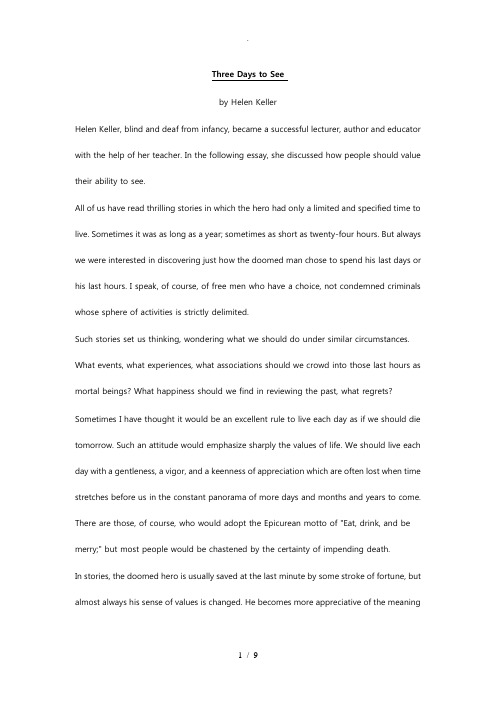
Three Days to Seeby Helen KellerHelen Keller, blind and deaf from infancy, became a successful lecturer, author and educator with the help of her teacher. In the following essay, she discussed how people should value their ability to see.All of us have read thrilling stories in which the hero had only a limited and specified time to live. Sometimes it was as long as a year; sometimes as short as twenty-four hours. But always we were interested in discovering just how the doomed man chose to spend his last days or his last hours. I speak, of course, of free men who have a choice, not condemned criminals whose sphere of activities is strictly delimited.Such stories set us thinking, wondering what we should do under similar circumstances. What events, what experiences, what associations should we crowd into those last hours as mortal beings? What happiness should we find in reviewing the past, what regrets? Sometimes I have thought it would be an excellent rule to live each day as if we should die tomorrow. Such an attitude would emphasize sharply the values of life. We should live each day with a gentleness, a vigor, and a keenness of appreciation which are often lost when time stretches before us in the constant panorama of more days and months and years to come. There are those, of course, who would adopt the Epicurean motto of "Eat, drink, and be merry;" but most people would be chastened by the certainty of impending death.In stories, the doomed hero is usually saved at the last minute by some stroke of fortune, but almost always his sense of values is changed. He becomes more appreciative of the meaningof life and its permanent spiritual values. It has often been noted that those who live, or have lived, in the shadow of death bring a mellow sweetness to everything they do.Most of us, however, take life for granted. We know that one day we must die, but usually we picture that day as far in the future. When we are in buoyant health, death is all but unimaginable. We seldom think of it. The days stretch out in an endless vista. So we go about our petty tasks, hardly aware of our listless attitude toward life.The same lethargy, I am afraid, characterizes the use of all our faculties and senses. Only the deaf appreciate hearing, only the blind realize the manifold blessings that lie in sight. Particularly does this observation apply to those who have lost sight and hearing in adult life. But those who have never suffered impairment of sight or hearing seldom make the fullest use of these blessed faculties. Their eyes and ears take in all sights and sounds hazily, without concentration, and with little appreciation. It is the same old story of not being grateful for what we have until we lose it, of not being conscious of health until we are ill.I have often thought it would be a blessing if each human being were stricken blind and deaf for a few days at some time during his early adult life. Darkness would make him more appreciative of sight; silence would teach him the joys of sound.Now and then I have tested my seeing friends to discover what they see. Recently I was visited by a very good friend who had just returned from a long walk in the woods, and I asked her what she had observed. "Nothing in particular," she replied. I might have been incredulous had I not been accustomed to such responses, for long ago I became convinced that the seeing see little.How was it possible, I asked myself, to walk for an hour through the woods and see nothing worthy of note? I who cannot see find hundreds of things to interest me through mere touch.I feel the delicate symmetry of a leaf. I pass my hands lovingly about the smooth skin of a silver birch, or the rough shaggy bark of a pine. In spring I touch the branches of trees hopefully in search of a bud, the first sign of awakening Nature after her winter's sleep. I feel the delightful, velvety texture of a flower, and discover its remarkable convolutions; and something of the miracle of Nature is revealed to me. Occasionally, if I am very fortunate, I place my hand gently on a small tree and feel the happy quiver of a bird in full song. I am delighted to have the cool water of a brook rush through my open fingers. To me a lush carpet of pine needles or spongy grass is more welcome than the most luxurious Persian rug. To me the pageant of seasons is a thrilling and unending drama, the action of which streams through my finger tips.At times my heart cries out with longing to see all these things. If I can get so much pleasure from mere touch, how much more beauty must be revealed by sight. Yet, those who have eyes apparently see little. The panorama of colour and action which fills the world is taken for granted. It is human, perhaps, to appreciate little that which we have and to long for that which we have not, but it is a great pity that in the world of light the gift of sight is used only as a mere convenience rather than as a means of adding fullness to life.If I were the president of a university I should establish a compulsory course in "How to Use Your Eyes". The professor would try to show his pupils how they could add joy to their lives by really seeing what passes unnoticed before them. He would try to awake their dormant and sluggish faculties.Suppose you set your mind to work on the problem of how you would use your own eyes if you had only three more days to see. If with the oncoming darkness of the third night you knew that the sun would never rise for you again, how would you spend those three precious intervening days? What would you most want to let your gaze rest upon?I, naturally, should want most to see the things which have become dear to me through my years of darkness. You, too, would want to let your eyes rest long on the things that have become dear to you so that you could take the memory of them with you into the night that loomed before you.I should want to see the people whose kindness and gentleness and companionship have made my life worth living. First I should like to gaze long upon the face of my dear teacher, Mrs. Anne Sullivan Macy, who came to me when I was a child and opened the outer world to me. I should want not merely to see the outline of her face, so that I could cherish it in my memory, but to study that face and find in it the living evidence of the sympathetic tenderness and patience with which she accomplished the difficult tasks of my education. I should like to see in her eyes that strength of character which has enabled her to stand firm in the face of difficulties, and that compassion for all humanity which she has revealed to me so often.I do not know what it is to see into the heart of a friend through that "window of the soul", the eye. I can only "see" through my finger tips the outline of a face. I can detect laughter, sorrow, and many other obvious emotions. I know my friends from the feel of their faces. But I cannot really picture their personalities by touch. I know their personalities, of course,through other means, through the thoughts they express to me, through whatever of their actions are revealed to me. But I am denied that deeper understanding of them which I am sure would come through sight of them through watching their reactions to various expressed thoughts and circumstances, through noting the immediate and fleeting reactions of their eyes and countenance.Friends who are near to me I know well, because through the months and years they reveal themselves to me in all their phases; but of causal friends I have only an incomplete impression, an impression gained from a handclasp, from spoken words which I take from their lips with my finger tips, or which they tap into the palm of my hand.How much easier, how much more satisfying it is for you who can see to grasp quickly the essential qualities of another person by watching the subtleties of expression, the quiver of a muscle, the flutter of a hand. But does it ever occur to you to use your sight to see into the inner nature of a friend or acquaintance? Do not most of you seeing people grasp casually the outward features of a face and let it go at that?For instance, can you describe accurately the faces of five good friends? Some of you can, but many cannot. As an experiment, I have questioned husbands of long standing about the color of their wives' eyes, and often they express embarrassed confusion and admit that they do not know. And, incidentally, it is a chronic complaint of wives that their husbands do not notice new dresses, new hats, and changes in household arrangements.The eyes of seeing persons soon become accustomed to the routine of their surroundings, and they actually see only the startling and spectacular. But even in viewing the most spectacular sights the eyes are lazy. Court records reveal every day how inaccurately"eyewitnesses" see. A given event will be "seen" in several different ways by as many witnesses. Some see more than others, but few see everything that is within the range of their vision.Oh, the things that I should see if I had the power of sight for just three days!<1634 words> 译文假如我有三天光明海伦·凯勒海伦·凯勒自幼就又盲又聋,在老师的帮助下成为一名成功的讲师、作家及教育家。
英语泛读教程4课文翻译之欧阳地创编

Unit1天才与工匠许多人羡慕作家们的精彩小说,但却很少有人知道作家们是如何辛勤笔耕才使一篇小说问世的。
以下的短文将讨论小说的酝酿过程,以及作家是如何将这小说雕琢成一件精致完美的艺术品。
有一次,我在暮色中来到小树林边一棵鲜花盛开的小桃树前。
我久久站在那里凝视着,直到最后一道光线消逝。
我看不到那树原先的模样,看不见曾穿透果核,能崩碎你的牙齿的力量,也看不到那使它与橡树和绿草相区别的原则。
显现在我面前的,是一种深邃而神秘的魅力。
当读者读到一部杰出的小说时,他也会这样如痴如狂,欲将小说字字句句刻骨铭心,不提出任何问题。
但即使是个初学写作者也知道,除那将小说带到世上的文字之外,还有更多的构成小说生命的因素,小说的生命并不始于写作,而始于内心深处的构思。
要创作出有独创性的作品,并不要求懂得创造的功能。
多少世纪以来的艺术、哲学及科学创造都出自人们的头脑,而创造者也许从未想到去关注创造的内在过程。
然而,在我看来,对创造工作一定程度的了解,至少会使我们通过知道两个事实,增长我们处理正在出现的故事的智慧。
首先,天赋不是掌握了技艺的艺术家独有的特性,而是人脑的创造性功能。
不仅所有对技艺的掌握都含有天赋,而且每个人都具有天赋,无论他的天赋发展是何等不充分。
对技艺的掌握是天赋的显现,是经过培养的,发展了的和受过训练的天赋。
你的天赋在最原始的层面上起作用。
它的任务就是创造。
它是你的故事的创造者。
第二,将你的小说带进世界的文字是艺术家的工作,它就和一个泥瓦匠的工作一样,有意识、谨慎而实实在在。
天赋正如理解力、记忆力和想象力一样是我们的精神禀赋中的天然部分,而技艺却不是。
它必须通过实践才能学到,并要通过实践才能掌握。
如果要使在我们内心深处浮现的故事跃然纸上,光彩照人,那么,每个故事都须有感染力极强的优雅文笔。
只有健全的技艺才能使我们做到这一点。
一个故事是如何酝酿成的呢?据说,我们从一生中的前二十年,或许前五年起就开始写作。
这可能取决于个人,而写作中的很多事都取决于个人。
刘乃银英语泛读4(第三版)课文翻译
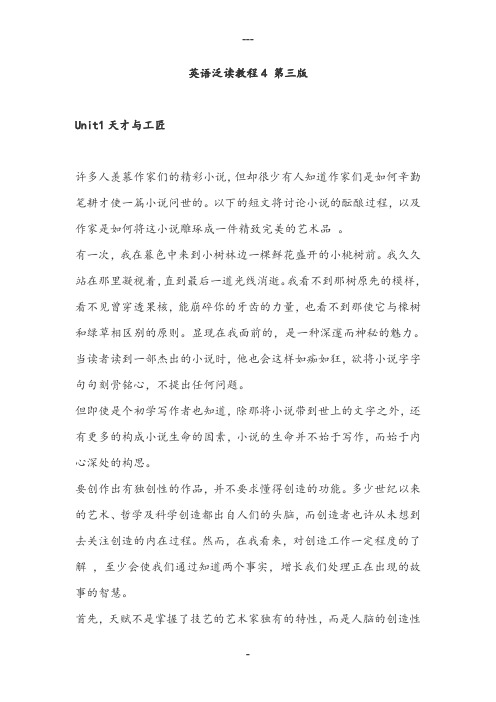
英语泛读教程4 第三版Unit1天才与工匠许多人羡慕作家们的精彩小说,但却很少有人知道作家们是如何辛勤笔耕才使一篇小说问世的。
以下的短文将讨论小说的酝酿过程,以及作家是如何将这小说雕琢成一件精致完美的艺术品。
有一次,我在暮色中来到小树林边一棵鲜花盛开的小桃树前。
我久久站在那里凝视着,直到最后一道光线消逝。
我看不到那树原先的模样,看不见曾穿透果核,能崩碎你的牙齿的力量,也看不到那使它与橡树和绿草相区别的原则。
显现在我面前的,是一种深邃而神秘的魅力。
当读者读到一部杰出的小说时,他也会这样如痴如狂,欲将小说字字句句刻骨铭心,不提出任何问题。
但即使是个初学写作者也知道,除那将小说带到世上的文字之外,还有更多的构成小说生命的因素,小说的生命并不始于写作,而始于内心深处的构思。
要创作出有独创性的作品,并不要求懂得创造的功能。
多少世纪以来的艺术、哲学及科学创造都出自人们的头脑,而创造者也许从未想到去关注创造的内在过程。
然而,在我看来,对创造工作一定程度的了解,至少会使我们通过知道两个事实,增长我们处理正在出现的故事的智慧。
首先,天赋不是掌握了技艺的艺术家独有的特性,而是人脑的创造性功能。
不仅所有对技艺的掌握都含有天赋,而且每个人都具有天赋,无论他的天赋发展是何等不充分。
对技艺的掌握是天赋的显现,是经过培养的,发展了的和受过训练的天赋。
你的天赋在最原始的层面上起作用。
它的任务就是创造。
它是你的故事的创造者。
第二,将你的小说带进世界的文字是艺术家的工作,它就和一个泥瓦匠的工作一样,有意识、谨慎而实实在在。
天赋正如理解力、记忆力和想象力一样是我们的精神禀赋中的天然部分,而技艺却不是。
它必须通过实践才能学到,并要通过实践才能掌握。
如果要使在我们内心深处浮现的故事跃然纸上,光彩照人,那么,每个故事都须有感染力极强的优雅文笔。
只有健全的技艺才能使我们做到这一点。
一个故事是如何酝酿成的呢?据说,我们从一生中的前二十年,或许前五年起就开始写作。
英语泛读教程4课文翻译之欧阳音创编

Unit1天才与工匠许多人羡慕作家们的精彩小说,但却很少有人知道作家们是如何辛勤笔耕才使一篇小说问世的。
以下的短文将讨论小说的酝酿过程,以及作家是如何将这小说雕琢成一件精致完美的艺术品。
有一次,我在暮色中来到小树林边一棵鲜花盛开的小桃树前。
我久久站在那里凝视着,直到最后一道光线消逝。
我看不到那树原先的模样,看不见曾穿透果核,能崩碎你的牙齿的力量,也看不到那使它与橡树和绿草相区别的原则。
显现在我面前的,是一种深邃而神秘的魅力。
当读者读到一部杰出的小说时,他也会这样如痴如狂,欲将小说字字句句刻骨铭心,不提出任何问题。
但即使是个初学写作者也知道,除那将小说带到世上的文字之外,还有更多的构成小说生命的因素,小说的生命并不始于写作,而始于内心深处的构思。
要创作出有独创性的作品,并不要求懂得创造的功能。
多少世纪以来的艺术、哲学及科学创造都出自人们的头脑,而创造者也许从未想到去关注创造的内在过程。
然而,在我看来,对创造工作一定程度的了解,至少会使我们通过知道两个事实,增长我们处理正在出现的故事的智慧。
首先,天赋不是掌握了技艺的艺术家独有的特性,而是人脑的创造性功能。
不仅所有对技艺的掌握都含有天赋,而且每个人都具有天赋,无论他的天赋发展是何等不充分。
对技艺的掌握是天赋的显现,是经过培养的,发展了的和受过训练的天赋。
你的天赋在最原始的层面上起作用。
它的任务就是创造。
它是你的故事的创造者。
第二,将你的小说带进世界的文字是艺术家的工作,它就和一个泥瓦匠的工作一样,有意识、谨慎而实实在在。
天赋正如理解力、记忆力和想象力一样是我们的精神禀赋中的天然部分,而技艺却不是。
它必须通过实践才能学到,并要通过实践才能掌握。
如果要使在我们内心深处浮现的故事跃然纸上,光彩照人,那么,每个故事都须有感染力极强的优雅文笔。
只有健全的技艺才能使我们做到这一点。
一个故事是如何酝酿成的呢?据说,我们从一生中的前二十年,或许前五年起就开始写作。
这可能取决于个人,而写作中的很多事都取决于个人。
泛读翻译
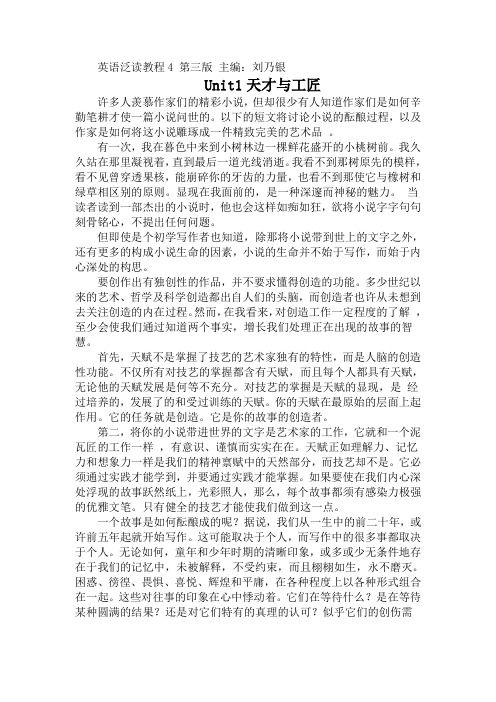
英语泛读教程4 第三版主编:刘乃银Unit1天才与工匠许多人羡慕作家们的精彩小说,但却很少有人知道作家们是如何辛勤笔耕才使一篇小说问世的。
以下的短文将讨论小说的酝酿过程,以及作家是如何将这小说雕琢成一件精致完美的艺术品。
有一次,我在暮色中来到小树林边一棵鲜花盛开的小桃树前。
我久久站在那里凝视着,直到最后一道光线消逝。
我看不到那树原先的模样,看不见曾穿透果核,能崩碎你的牙齿的力量,也看不到那使它与橡树和绿草相区别的原则。
显现在我面前的,是一种深邃而神秘的魅力。
当读者读到一部杰出的小说时,他也会这样如痴如狂,欲将小说字字句句刻骨铭心,不提出任何问题。
但即使是个初学写作者也知道,除那将小说带到世上的文字之外,还有更多的构成小说生命的因素,小说的生命并不始于写作,而始于内心深处的构思。
要创作出有独创性的作品,并不要求懂得创造的功能。
多少世纪以来的艺术、哲学及科学创造都出自人们的头脑,而创造者也许从未想到去关注创造的内在过程。
然而,在我看来,对创造工作一定程度的了解,至少会使我们通过知道两个事实,增长我们处理正在出现的故事的智慧。
首先,天赋不是掌握了技艺的艺术家独有的特性,而是人脑的创造性功能。
不仅所有对技艺的掌握都含有天赋,而且每个人都具有天赋,无论他的天赋发展是何等不充分。
对技艺的掌握是天赋的显现,是经过培养的,发展了的和受过训练的天赋。
你的天赋在最原始的层面上起作用。
它的任务就是创造。
它是你的故事的创造者。
第二,将你的小说带进世界的文字是艺术家的工作,它就和一个泥瓦匠的工作一样,有意识、谨慎而实实在在。
天赋正如理解力、记忆力和想象力一样是我们的精神禀赋中的天然部分,而技艺却不是。
它必须通过实践才能学到,并要通过实践才能掌握。
如果要使在我们内心深处浮现的故事跃然纸上,光彩照人,那么,每个故事都须有感染力极强的优雅文笔。
只有健全的技艺才能使我们做到这一点。
一个故事是如何酝酿成的呢?据说,我们从一生中的前二十年,或许前五年起就开始写作。
英语泛读教程4unit 2 Three Days to See课文和译文
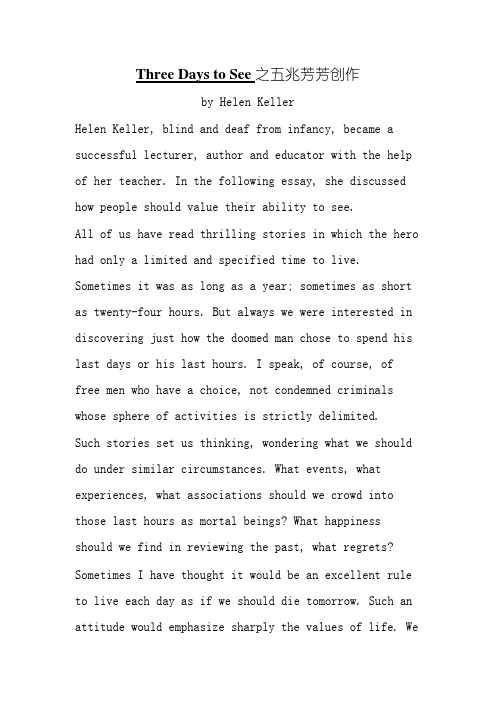
Three Days to See 之五兆芳芳创作by Helen KellerHelen Keller, blind and deaf from infancy, became a successful lecturer, author and educator with the help of her teacher. In the following essay, she discussed how people should value their ability to see.All of us have read thrilling stories in which the hero had only a limited and specified time to live. Sometimes it was as long as a year; sometimes as short as twenty-four hours. But always we were interested in discovering just how the doomed man chose to spend his last days or his last hours. I speak, of course, of free men who have a choice, not condemned criminals whose sphere of activities is strictly delimited.Such stories set us thinking, wondering what we should do under similar circumstances. What events, what experiences, what associations should we crowd into those last hours as mortal beings? What happiness should we find in reviewing the past, what regrets? Sometimes I have thought it would be an excellent rule to live each day as if we should die tomorrow. Such an attitude would emphasize sharply the values of life. Weshould live each day with a gentleness, a vigor, and a keenness of appreciation which are often lost when time stretches before us in the constant panorama of more days and months and years to come. There are those, of course, who would adopt the Epicurean motto of “Eat, drink, and be merry;” but most people would be chastened by the certainty of impending death.In stories, the doomed hero is usually saved at thelast minute by some stroke of fortune, but almostalways his sense of values is changed. He becomes more appreciative of the meaning of life and its permanent spiritual values. It has often been noted that thosewho live, or have lived, in the shadow of death bring a mellow sweetness to everything they do.Most of us, however, take life for granted. We knowthat one day we must die, but usually we picture that day as far in the future. When we are in buoyant health, death is all but unimaginable. We seldom think of it. The days stretch out in an endless vista. So we goabout our petty tasks, hardly aware of our listless attitude toward life.The same lethargy, I am afraid, characterizes the use of all our faculties and senses. Only the deaf appreciate hearing, only the blind realize the manifold blessings that lie in sight. Particularly does this observation apply to those who have lost sight and hearing in adult life. But those who have never suffered impairment of sight or hearing seldom make the fullest use of these blessed faculties. Their eyes and ears take in all sights and sounds hazily, without concentration, and with little appreciation. It is the same old story of not being grateful for what we have until we lose it, of not being conscious of healthuntil we are ill.I have often thought it would be a blessing if each human being were stricken blind and deaf for a few days at some time during his early adult life. Darkness would make him more appreciative of sight; silence would teach him the joys of sound.Now and then I have tested my seeing friends to discover what they see. Recently I was visited by a very good friend who had just returned from a long walk in the woods, and I asked her what she had observed.“Nothing in particular,” she replied. I might have been incredulous had I not been accustomed to such responses, for long ago I became convinced that the seeing see little.How was it possible, I asked myself, to walk for an hour through the woods and see nothing worthy of note?I who cannot see find hundreds of things to interest me through mere touch. I feel the delicate symmetry of a leaf. I pass my hands lovingly about the smooth skin of a silver birch, or the rough shaggy bark of a pine. In spring I touch the branches of trees hopefully in search of a bud, the first sign of awakening Nature after her winter's sleep. I feel the delightful, velvety texture of a flower, and discover its remarkable convolutions; and something of the miracle of Nature is revealed to me. Occasionally, if I am very fortunate, I place my hand gently on a small tree and feel the happy quiver of a bird in full song. I am delighted to have the cool water of a brook rush through my open fingers. To me a lush carpet of pine needles or spongy grass is more welcome than the most luxurious Persian rug. To me the pageant of seasons isa thrilling and unending drama, the action of which streams through my finger tips.At times my heart cries out with longing to see all these things. If I can get so much pleasure from mere touch, how much more beauty must be revealed by sight. Yet, those who have eyes apparently see little. The panorama of colour and action which fills the world is taken for granted. It is human, perhaps, to appreciate little that which we have and to long for that which we have not, but it is a great pity that in the world of light the gift of sight is used only as a mere convenience rather than as a means of adding fullness to life.If I were the president of a university I should establish a compulsory course in “How to U se Your Eyes”. The professor would try to show his pupils how they could add joy to their lives by really seeing what passes unnoticed before them. He would try to awake their dormant and sluggish faculties.Suppose you set your mind to work on the problem of how you would use your own eyes if you had only three more days to see. If with the oncoming darkness of the thirdnight you knew that the sun would never rise for you again, how would you spend those three precious intervening days? What would you most want to let your gaze rest upon?I, naturally, should want most to see the things which have become dear to me through my years of darkness. You, too, would want to let your eyes rest long on the things that have become dear to you so that you could take the memory of them with you into the night that loomed before you.I should want to see the people whose kindness and gentleness and companionship have made my life worth living. First I should like to gaze long upon the face of my dear teacher, Mrs. Anne Sullivan Macy, who came to me when I was a child and opened the outer world to me. I should want not merely to see the outline of her face, so that I could cherish it in my memory, but to study that face and find in it the living evidence of the sympathetic tenderness and patience with which she accomplished the difficult tasks of my education. I should like to see in her eyes that strength ofcharacter which has enabled her to stand firm in the face of difficulties, and that compassion for all humanity which she has revealed to me so often.I do not know what it is to see into the heart of a friend through that “window of the soul”, the eye. I can only “see” through my finger tips the outline of a face. I can detect laughter, sorrow, and many other obvious emotions. I know my friends from the feel of their faces. But I cannot really picture their personalities by touch. I know their personalities, of course, through other means, through the thoughts they express to me, through whatever of their actions are revealed to me. But I am denied that deeper understanding of them which I am sure would come through sight of them through watching their reactions to various expressed thoughts and circumstances, through noting the immediate and fleeting reactions of their eyes and countenance.Friends who are near to me I know well, because through the months and years they reveal themselves to me inall their phases; but of causal friends I have only an incomplete impression, an impression gained from ahandclasp, from spoken words which I take from theirlips with my finger tips, or which they tap into the palm of my hand.How much easier, how much more satisfying it is for you who can see to grasp quickly the essential qualities of another person by watching the subtleties of expression, the quiver of a muscle, the flutter of a hand. But does it ever occur to you to use your sight to see into the inner nature of a friend or acquaintance? Do not mostof you seeing people grasp casually the outwardfeatures of a face and let it go at that?For instance, can you describe accurately the faces of five good friends? Some of you can, but many cannot. As an experiment, I have questioned husbands of long standing about the color of their wives' eyes, andoften they express embarrassed confusion and admit that they do not know. And, incidentally, it is a chronic complaint of wives that their husbands do not noticenew dresses, new hats, and changes in household arrangements.The eyes of seeing persons soon become accustomed tothe routine of their surroundings, and they actuallysee only the startling and spectacular. But even in viewing the most spectacular sights the eyes are lazy. Court records reveal every day how inaccurately “eyewitnesses” see. A given event will be “seen” in several different ways by as many witnesses. Some see more than others, but few see everything that is within the range of their vision.Oh, the things that I should see if I had the power of sight for just three days!(1634 words)译文假设我有三天光亮海伦·凯勒海伦·凯勒自幼就又盲又聋,在老师的帮忙下成为一名成功的讲师、作家及教育家.在这篇文章里,海伦·凯勒讨论了人们应该怎样珍惜自己的视觉能力我们大家都读过这样一些惊心动魄的故事,故事中的主人公能活的时间有限而具体,或长达一年,或短至24小时.但是我们总是感兴趣的是,行将死亡的人究竟愿意怎样度过他的最后时光.当然,我说的是能进行选择的自由人,而不是勾当规模受到严格限制的囚犯.这些故事启迪我们思考,诱发我们想象,当我们处于此类情况时,该怎么做呢?作为常人,我们在最后的时刻会急于想干些什么,体验些什么,联想些什么呢?回顾往事时,我们又能领略到何种快慰,何种懊悔呢?有时我想,如果我们度过每一天时都假定明天行将去世,这会是个极好的准则.这样的处世态度会强烈地突出生命的价值.我们会亲切地、暮气蓬勃地、感触感染强烈地来度过每一天,而这一切却往往在日复一日延续的时光与岁月之中消失.当然,有些人会奉行享乐主义“吃喝玩乐”的信条,但是大多数人则会因死亡就在眼前而心灵得到净化.在故事中,那死神呼喊的主人公通常在最后时刻交上好运而取得拯救,但他的价值不雅几近总是产生了变更.他加倍珍视生命的意义及其永恒而神圣的价值.人们经常注意到,那些生活在或曾生活在死亡的阴影下的人,对他们所做的每一件事都付与甜美的色彩.然而,我们中间大多数人则把生命视为理所当然.我们知道,总有一天我们会死去,但通常我们又把那一天想象为遥远的未来.当我们身体安康时,死亡是件难以想象的事,我们几近不会想到它.岁月无穷,因此我们忙于种种琐事,几近意识不到我们漠然的生活态度.我们在使用感到功效时,恐怕也持同样的冷漠态度.只有聋者才知道听觉的重要,只有盲人才理解视觉给人带来的各类恩赐.这一不雅点特别适用于那些在成年后才丧失视觉和听觉的人.而那些视觉和听觉从未受到损害的人,则很少充分利用这些神圣的官能.他们的眼睛和耳朵模糊地、漫不经心地、不加欣赏地纳入所有的景象和声音.仍是那句老话:东西丢失前方知珍贵,直到生病时才情安康.我经常想,如果每团体在刚成年时某个时候能失明或失聪几天,这也许将是件喜事.暗中将使他加倍珍视景象;而沉寂则将教他领略声音的欢快.我不时考一考我的有视力的朋友,以了解他们看到了什么.最近一位好朋友来看我,她是在林中溜达了好一会儿才回来的,我问她不雅察到了些什么.“没什么特此外东西,”她答道.要不是我对类似的反响已习以为常的话,我是会觉得难以置信的.其实,我早已深信:有视力者所见甚少.我问自己,在林中溜达了一个小时而竟未看到什么值得注意的东西,这怎么可能呢?我这个看不见东西的人,仅凭触摸就发明千百种使我感兴趣的东西.我感到到树叶精致的对称.我用手爱抚着滑腻的白烨树皮,或是粗糙的松树皮.春天里,我满怀希望地触摸树枝,寻找一个幼芽——大自然经过冬日沉睡重又苏醒的最初征兆.我摸着花朵上那可爱的天鹅绒般的质地,以及它那叠合巧妙的花苞,于是我领略到了某种大自然的神奇.偶尔,如果十分幸运的话,我把手轻轻搭在一棵小树上,能感应一只小鸟儿尽情欢歌的哆嗦.我很是欢快让清凉的溪水流过我张开的手指.对我来说,那厚密的松针层或茂盛松软的草地比奢华的波斯地毯更惬意;对我来说,四季的变幻多姿宛如一出动人心弦永不尽止的戏剧,它的情节似流水从我指尖慢慢流过.我的心时时在呼号,渴望能见到所有这一切.如果我单靠触摸就能取得如此多的乐趣,那么通过视觉则能领略到更多美景!可是,那些视觉完好的人显然所见甚少.大千世界的五光十色与千姿百态被认为是理所当然.对已取得的不以为然,而对未取得的却期盼不已,这一点也许是人类的特性,可是,很是遗憾,在光亮的世界里,天赐的视觉只被当作一种单纯的便利,而不是一种使生活日益完美的手段.如果我是大学校长,我就要开设一门必修课,“如何使用你们的眼睛”.教授应尽力向学生演示,如何做到真正看见那些从他们面前不知不觉溜掉的东西,从而为自己的生活增添快乐.他将尽力叫醒他们那些昏睡懒散的感官.假定你在开动脑筋研究这一问题:如果你只有三天的视力,你将如何使用你的眼睛呢?如果你知道,当第三天的黑夜来临,太阳就永远不再为你升起,你将如何度过这宝贵的三天呢?你最想让你的目光落在何处?我当然最愿意看的,是那些在我整个失明岁月里对我已变得亲切的东西.你也会想让你的目光长久地停留在那些对你已变得亲切的东西上,这样你就可以把对它们的记忆带进那悄然而来的漫漫长夜中去.我要看看那些待我仁慈、温和、友好,从而使我的生活变得有价值的人.首先,我要好好地端详我的恩师安·沙利文·梅丝夫人的脸.她在我年幼的时候就来到我身边,替我打开了外部世界.我不但想看她的脸形,以便能把它珍藏在我的记忆中,并且还想细细揣摩这脸容,为她那柔情与耐心找到活生生的证据,她正是怀着这种柔情与耐心完成了教育我的艰难任务.我想在她的眼中看到那种使她果断地面对各类困难的特性的力量,以及那种经常在我面前流露出来的对全人类的同情心.我不知道,透过"心灵之窗",即眼睛,来探视一个朋友的心是怎么回事.我只能通过我的指尖来"看"一张脸的轮廓.我能探察到欢笑、忧伤和许多其他明显的豪情.我按照触摸脸庞的感到来识别朋友,但是我的确不克不及靠触摸来描绘出他们的特性.当然,我通过其他手段,通过他们向我表达的思想,通过他们向我表示出的步履来了解他们的特性.但是,我无法对他们有更深的理解,因为我确信,要达到这种更深的理解,必须要目视他们,不雅察他们对各类所表达的思想及情况所作的反响,留意他们眼睛里和脸上那种转瞬即逝的反响.我熟悉和我亲近的朋友,因为长年累月他们向我显露了自己的各个方面;然而对于偶尔结识的朋友我只有一种不完全的印象,这种印象是仅凭一次握手,一些言语取得的.我用指尖触摸他们的嘴唇,或是靠他们叩击我的手掌而获得这些言语.相比之下,你们这些能看见的人,通过不雅察脸色的微妙变更、肌肉的哆嗦和手的摆动来迅速地掌控他人的实质特点,就容易得多,也令人满意得多.但是,你们可曾想到要用自己的视觉去看透一个朋友或熟人的内在性格?你们这些有视觉的人中的大多数,不就是随便看到一张脸的外部特征就到此为止了吗?举例来说,你能准确地描绘出五个好朋友的脸形吗?你们中有些人可以,但许多人不成.作为试验,我曾向一些结婚多年的丈夫询问过他们妻子眼睛的颜色,但他们经常表示出为难困惑,承认不知道.顺便提一下,妻子们老是埋怨丈夫不注意她们的新衣服、新帽子以及房间安插中的变更.有视觉的人,眼睛很快就习惯了周围的日常事物,因此他实际上只见到一些惊人的、壮不雅的景象.但是,哪怕是在看最壮不雅的局面时,他们的眼睛也是懒洋洋的.法院记实天天都标明“目击者”所见是多么地禁绝确.某一事件可能被几个目击者从几个不合角度“看到”;有些人比他人看得多些,但几近没有人看到他们视野之内的一切.哦,如果我能有即便仅仅三天的光亮,我将能见到多少我想看到的东西啊!。
- 1、下载文档前请自行甄别文档内容的完整性,平台不提供额外的编辑、内容补充、找答案等附加服务。
- 2、"仅部分预览"的文档,不可在线预览部分如存在完整性等问题,可反馈申请退款(可完整预览的文档不适用该条件!)。
- 3、如文档侵犯您的权益,请联系客服反馈,我们会尽快为您处理(人工客服工作时间:9:00-18:30)。
第一单元第一篇"Good words cost nothing, but are worth much,"said Thomas Fuller,the 17th century British scholar.“良言不费分文,但价值甚大,”托马斯说丰满,17th世纪英国学者。
They serve to give encouragement and smooth away differences and misunderstandings, as this article explains.他们服役给予鼓励和克服差异和误解,因为这篇文章解释了。
"Maybe when I'm a hundred,I'll get used to having everything I do taken for granted,"a young homemaker confided to her neighbor.“也许当我一百岁时,我就会习惯吃我做的一切视为理所当然,”一个年轻的家庭主妇被任命她的邻居。
"If Bill would compliment me once in a while, he'd make my life much happier."“如果法案恭维我,偶尔也好,他会使我的生活更幸福。
”Few of us realize how much we need encouragement.我们很少有人意识到我们是多么需要鼓励的。
Yet we must bask in the warmth of approval now and then or lose our self-confidence.但是我们仍然必须沐浴在温暖的批准,否则现在失去自己的自信。
All of us need to feel needed and admired.我们都需要去感觉需要和赞赏。
But unless we hear words of praise from someone else,how can we know that we are valued friends or co-workers?但是如果我们听到别人的赞扬之词,我们怎样才能知道我们有价值的朋友或同事呢?Anyone who wants to improve his relationships with others need only show a sympathetic understanding.任何人想要提高自己的和其他人的关系之间只需要显示一个有同情心的理解。
The way to express this understanding and to give others the feeling of importance and worthiness boils down to this:always look for something in the other person you can admire and praise--and tell him about it.这种理解的方式来表达,给别人的感觉,重要性和价值归结为:总是寻找一些其他的人,你可以欣赏和赞美——告诉他这件事。
We each have a mental picture of ourselves,a self-image.我们每个人都有自己的脑海里,一个自我形象。
To find life reasonably satisfying,that self-image must be one we live with,one we can like.去发现生活相当满足、自我形象必须是一个我们生活在一起的人,一个我们可以像。
When we are proud of our self-image,we feel confident and free to be ourselves.当我们以我们的队伍为荣的自我形象,我们相信自由是我们自己。
We function at our best.我们最好的一面。
我们功能When we are ashamed of our self-image,we attempt to hide it rather than express it.当我们自觉惭愧我们自己,我们尝试把它藏起来,而不是把它表达出来。
We become hostile and hard to get along with.我们变得敌意和很难相处。
A miracle happens to the person whose self-esteem has been raised.会发生奇迹的人的自尊已经复活了。
He suddenly likes other people better.他突然喜欢其他的人更好地。
He is kinder and more cooperative with those around him.他是仁慈和更多的合作与他周围的那些人。
Praise is the polish that helps keep his self-esteem bright and sparkling.赞美是波兰才使他的自尊心明亮晶莹剔透。
What has this to do with your giving praise?这有什么用你的赞美?A lot.You have the ability to perform that kind of miracle in another person.一个lot.You有能力执行这样的奇迹在另一个人。
When you add to his self-esteem,you make him want to like you and to cooperate with you.当你加入他的自尊,你让他想爱你,与你携手合作。
In a classic bit of advice,Lord Chesterfield suggested to his son that he fellow the example of the Duck de Nivernois:"You will perceive that he makes people pleased with him by making them first pleased with themselves."在一个经典的一些建议,主切斯特了他的建议,他的儿子为例Nivernois鸭德:“你会认识到他使人满意他通过使他们第一次满意自己。
”The effects of praise can be great indeed.赞美的影响可以确定无疑。
A new minister called to a church jokingly referred to as "the refrigerator",decided against criticizing his congregation for its coolness toward strangers.一个新部长被召到教堂开玩笑地称为“冰箱”,决定不指责他的会众面前它对于陌生人冷淡。
Instead,he beban welcoming visitors from the pulpit and telling his flock how friendly they were.相反,他beban接待来访者从讲坛,告诉自己的羊群怎样友好他们。
Time after time he held up a picture of the church as he wanted it to be,giving his people a reputation to live up to.一次又一次地让他举起了一幅巨大的教堂,因为他想做的,让他百姓的名声,使其与之相配。
The congregation thawed.会众解冻。
"Praise transformed the ice-cube members into warmhearted human beings,"he said.“赞扬改变了颗冰块或成员带入人类温情的,”他说。
Sincerity is essential in giving praise.真诚的赞美是十分必要的。
It lends potency to a compliment.它把一个恭维。
效力Coming home after a hard day's work ,the man who sees the faces of his children pressed against the window,watching for him,can water his soul with their silent but golden opinion.回家后,一天的辛苦工作的人,看到他的孩子们的脸紧贴着窗外,看着他,他们自己的灵魂能水无声但黄金的意见。
Praise helps rub off the sharp edges of daily contact.赞美有助于掉色刀边上的日常联系。
Nowhere is this truer than in marriage.没有哪个国家比在婚姻。
Yet it is perhaps in the home that the value of praise is less appreciated than elsewhere.然而,这也许是在家里的价值比其他地方更少感谢赞美。
The spouse who is alert to say the heartening thing at the right moment has learned one of the most important requirements for a happy family life.配偶谁是提醒说令人振奋的事情正好学会最重要的条件之一,一个幸福的家庭生活。
Children ,especially,are hungry for praise,reassurance and appreciation.儿童,特别是,都渴望赞美,安全感和欣赏。
A young mother told her pastor of a heartrending incident:一位年轻的母亲告诉她的牧师令人伤感的事:"My little boy often misbehaves,and I have to scold him.“我的小男孩常常言语,我不得不骂他。
